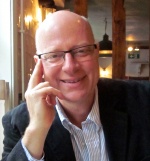
B.A., M.Phil., Ph.D. (Cambridge), FRHistS, FRSA
Chair in Creative and Cultural Practice
- About
-
- Email Address
- a.marcus@abdn.ac.uk
- Telephone Number
- +44 (0)1224 272632
- Office Address
School of Language, Literature, Music and Visual Culture
University of Aberdeen
Taylor A, King's College
Aberdeen
AB24 3UB
Scotland, UK- School/Department
- School of Language, Literature, Music and Visual Culture
Biography
Professor Alan Marcus is a cultural historian, film practitioner and Chair in Creative and Cultural Practice, having joined the University of Aberdeen in January 2007 from the University of Manchester, where he was Director of the Centre for Screen Studies. Previously to being appointed as Lecturer in Screen Studies in the Drama Department at Manchester in 1994 and devising the Drama and Screen Studies degree programme, he was on the film faculty of Art Center College of Design in Pasadena, CA. The research focus of postgraduate studies at Cambridge was on the influence of film and literary representations of the Inuit on public perceptions and government interventions, which drew on his fieldwork conducted in four Inuit communities in the Canadian Arctic. Undergraduate training at the University of Illinois in Film and Fine Arts. Writer, director and producer of documentaries and other television programmes for broadcasters ABC-TV and CBS-TV (USA) and Channel Four (UK), including films such as People of the Four Winds (1988) on cultural change as perceived through the work of Sami artists in a reindeer-herding community above the Arctic Circle in northern Sweden and Finland. Member of the Director's Guild of America since 1984. Work shown in photographic exhibitions, video installations in avant garde and museum exhibitions, and films at public screenings.
Qualifications
- PhD Arts1994 - University of Cambridge
- MPhil Arts1990 - University of Cambridge
- BA Arts1981 - University of Illinois
External Memberships
- Visiting Fellow, Wolfson College, University of Cambridge
- Visiting Fellow, Centre for Research in the Arts, Social Sciences and Humanities, University of Cambridge
- Life Member, Clare Hall, University of Cambridge
- Fellow, Royal Historical Society
- Fellow, Royal Society for Arts
- Fellow, Cambridge Philosophical Society
- Member, Directors Guild of America
- Research
-
Research Overview
Areas of research include:
- using creative practice-as-research to explore iconic post-traumatic sites and marginalized communities;
- representations of the city in film and visual culture;
- the history of documentary film, documentary practice modalities and other forms of documentary imagery;
- representations of the Holocaust and sites associated with Jewish identity and the diaspora, issues of ethnicity and the representation of indigenous peoples in documentary and popular film;
- variation in communication within and across cultures.
Creative practice-as-research projects and a selction of other publications, invited talks, keynotes and screenings of work are included below.
Current Research
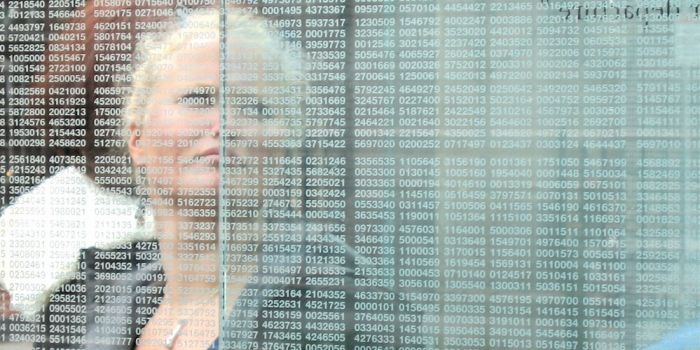
Research includes projects such as In Time of Place, which investigates selected symbolic sites associated with Jewish identity, the Diaspora and the Holocaust. The project focuses on the creation of four creative practice-as-research films made in Dachau, Venice, Prague and Boston, and a series of publications. The films, each 30 minutes in length, adopt an experimental observational approach to consider the stature and significance of place, its layering, reinvention and interpretation. The weight of history, the role of public memory and the act of memorialization are repositioned in the films through documenting both private and public engagement with the diverse urban environments. Archival imagery is not used, underscoring the intent that the films are about the present, as informed by the past.
The selection of sites for study and filming is guided by the fact that Venice is the site of a ghetto, where the term originated; Prague retains Europe’s oldest synagogue and Jewish cemetery; Dachau was the first Nazi state concentration camp, where the first prisoners to be executed were Jews; and Boston offers one of the most recent Holocaust memorial sites. All four films consider witnessing and the symbolic meaning of place in association with loss, absence, renewal and tourism. Most of the public who interact with the sites today were not first hand witnesses nor alive at the time of the Shoah. As such, the films engage with perceptions and debates on collective memory, cultural memory, and post-memory. The project also evaluates the way our digital culture influences how we interact with historic sites and use the camera to witness and situate our involvement.The In Time of Place project developed from work undertaken for the experimental video installation, Beautiful Dachau (2006). The title of the film was drawn from a poster on a bus shelter outside the former concentration camp that announced: 'Beautiful Dachau, things to see and do'. The slogan encapsulates the challenges facing a town whose name is associated with the torture and murder of thousands of people. This video installation and the issues it explores are examined in recent writings, including 'Spatial transfigurations in Beautiful Dachau' (The Journal of Architecture, 2006) and 'Beautiful Dachau's Contested Urban Identity', featured in Visualizing the City (Routledge, 2008). The film foregrounds a traumatic space and the erasure and reappropriation of place. Following its debut installation at the TRANS visual cultural exhibition and conference in Madison, Wisconsin in 2006, a series of screenings, keynotes and invited lectures on the project have been given in 2007 at the Constructions of Conflict Conference, Univ. of Wales, and at Harvard, Princeton and other institutions and venues. The film In Place of Death has had a number of screenings at keynotes and invited talks, including at Edinburgh, Liverpool, Haifa, Canterbury, Cambridge, Syracuse, Manchester and other universities and museums.
Other areas of practice-as-research extend the focus on post-traumatic sites, including in One Market Day (2011) made in Guernica, One Hot Day (2011) set in Hiroshima, and In the Birch Grove (2012) in Auschwitz-Birkenau.
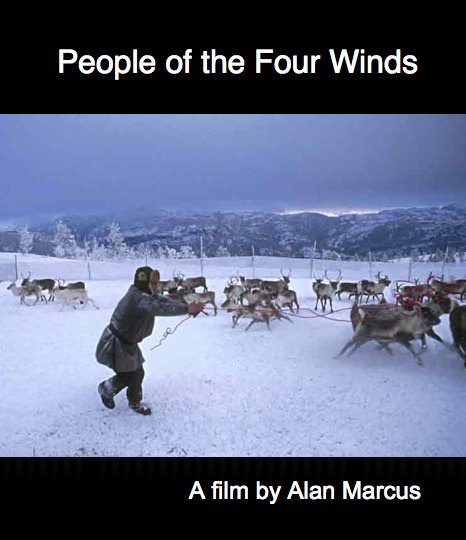
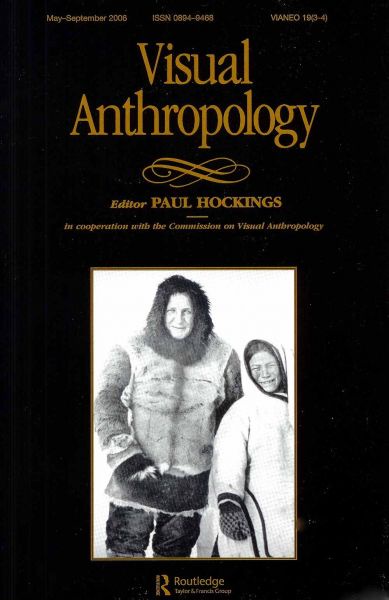
After making documentaries for British and American television on such topics as cultural change in a Sami reindeer-herding community in northern Sweden, People of the Four Winds (1989), Marcus conducted fieldwork in Inuit communities in the Canadian Arctic, which resulted in two books, including Relocating Eden (1995), and a series of articles. This research explored issues of filmic and literary representations of indigenous peoples, and such themes as cross-cultural perspectives of landscape, homeland and sense of place. His work in visual anthropology includes, Nanook of the North as Primal Drama (2006), on Robert Flaherty’s classic film set in the Canadian north.
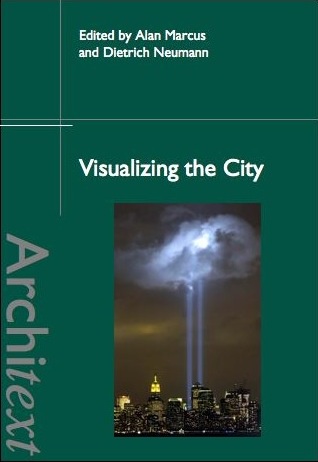
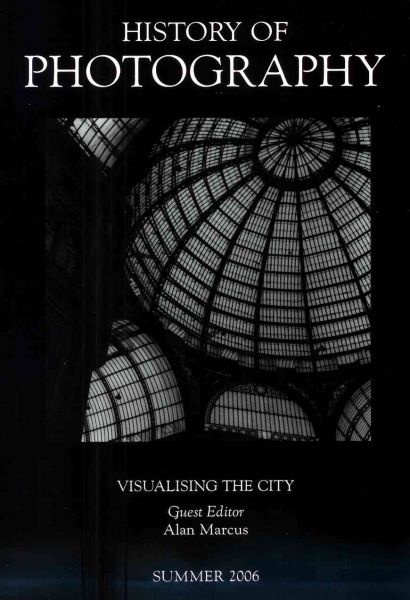
The stature and systemic role of the urban environment in society as featured in film, photography, pictorial art and other forms of visual culture, occupies a key area of his current research. His co-edited book, Visualizing the City (Routledge, 2008), presents a range of interdisciplinary explorations that illustrate our fascination with the urban experience, modernity and different architectural idioms. His guest edited journal issues on various aspects of Visualising the City include History of Photography (2006), The Journal of Architecture (2006) and Film Studies (2007).
Creative Practice-as-Research

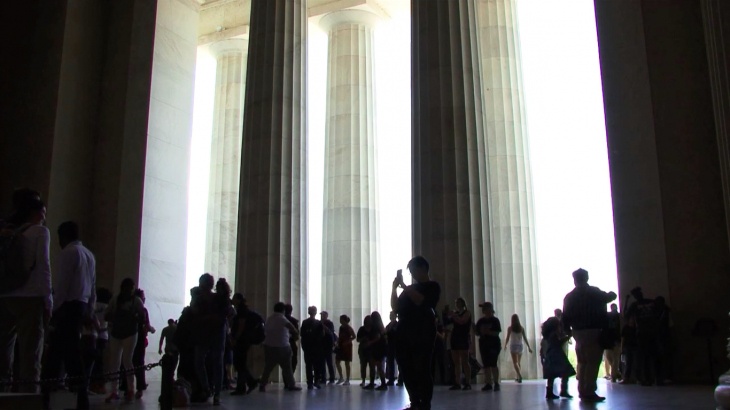
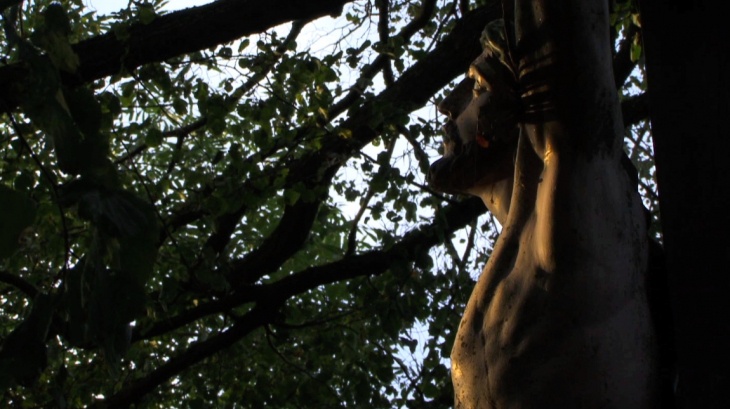
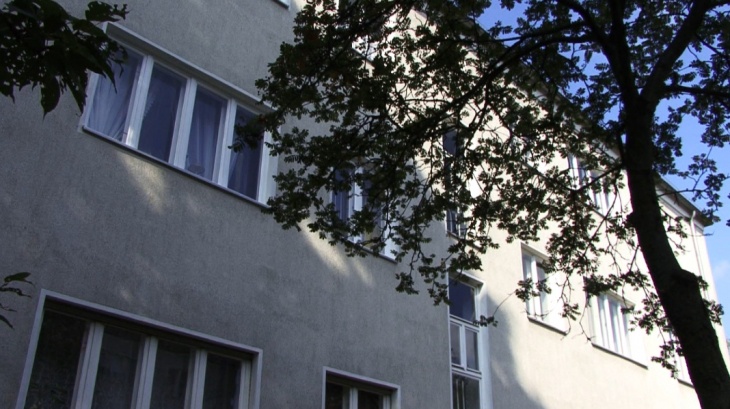
Feininger’s Window (2015), 30min research film which draws on a series of photographs held in Harvard’s photographic collection taken by the artist Lyonel Feininger from his apartment window in Berlin in the 1930s shortly before having to leave for America. The work takes the form of a city symphony film, reconsidering palimpsests set within Berlin’s contemporary urban environment.
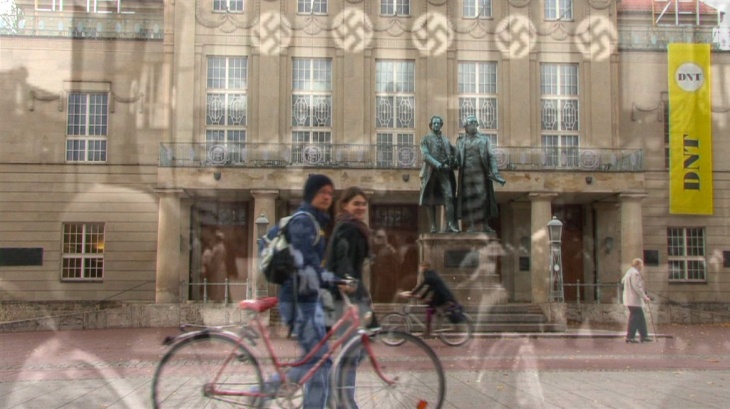

The Molo of Venice (2014), 30-minute observational film set in Venice, focusing on the Molo della Piazzetta, the city’s ceremonial entrance. Two works from the collection of the Norton Simon Museum in Pasadena, CA, Jean Baptiste Corot’s View of Venice: the Piazzetta seen from the Riva degli Schiavoni (1835) and An Extensive View of the Molo (c.1700) by Luca Carlevarijs, serve as the film’s starting point.
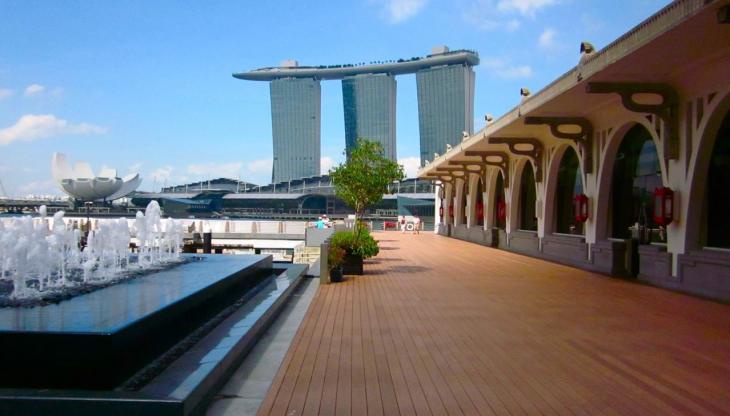
85 Miles North of the Equator (2013), 30-minute observational film set in Singapore, which utilizes the drawings of Charles Dyce from the 1840s and other visual documentation of the city, recontextualized in terms of contemporary urban developments, aspirational modernist architecture and public interactions. Screening with talk at Brown Univ (2013).

In the Birch Grove (2012), 30-minute observational film on contemporary sites at Auschwitz I and Auschwitz-Birkenau, drawing upon entries in the diary of SS medical doctor Prof. Johann Paul Kremer. Screenings with talks at Kings College London (2012), Holocaust Memorial Day, Aberdeen (2013), Brown Univ (2013), Portsmouth (2013), Brandeis (2013), Derry, NI (2013), London (2014), Columbia Univ (2015) and UCLA (2018).
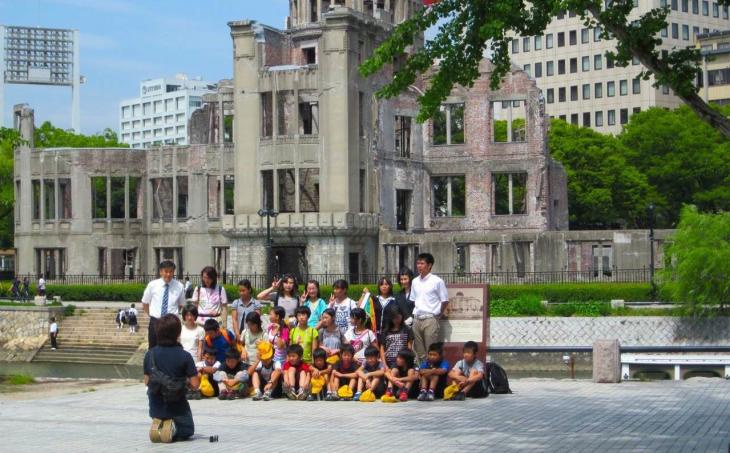
One Hot Day (2011), 30-minute observational film on an historic post-traumatic site, set in contemporary downtown Hiroshima, Japan. The film examines the redefinition of place at the hypocentre and its transfiguration through public forms of ritualized engagement. Screenings with talks at the Univ. of Hawaii (2014), Aberdeen (2015), Cambridge (2015).

One Market Day (2011), 30-minute observational film on an historic post-traumatic site, set in the contemporary Basque village of Guernica. Themes revealed in Picasso’s iconic work are considered within the present built environment. Screenings with talks at Liverpool (2011) and Aberdeen (2012).

The Memorial (2010), 30-minute practice-as-research film set in Boston, USA, focusing on the New England Holocaust Memorial. In Time of Place research project. Screenings and talk at York (2011) and special screening at SCMS Boston (2012).

The Cemetery (2010), 30-minute observational film set in the Jewish quarter in Prague, infused by the after presence of Franz Kafka. Forms part of the In Time of Place research project. Screening and talk at York (2011), Stockholm (2013), and Holocaust Memorial Day (2016).

The Ghetto (2009), 30-minute practice-as-research film set in Venice, Italy, that looks at ritualized activities by inhabitants and tourists within the built environment of the ancient Jewish quarter in Venice. In Time of Place research project. Screenings and talks at Cambridge (2009), Liverpool (2010), Dundee (2010), St. Francis, Nova Scotia (2010) and Caltech (2011).
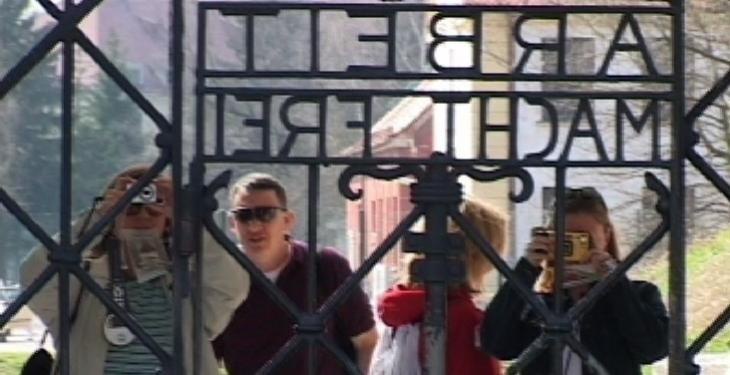
In Place of Death (2008), 30-minute observational film that explores issues of absence, touristic encounters and the identity of place in the town of Dachau and its former concentration camp. In Time of Place research project. Screenings and talks at Cambridge (2008), Derby (2008), Edinburgh (2008), Haifa (2008), Kent (2008), Liverpool (2008), Manchester (2008), Syracuse (2008), Dublin (2009), three events at Cambridge (2010), St Francis, Nova Scotia (2010), St Mary’s, Nova Scotia (2010), Caltech (2011), Krakow (2011), Warsaw (2011), Aberdeen (2013), Hawaii (2013), Aberdeen (2015), Reykjavik (2016).
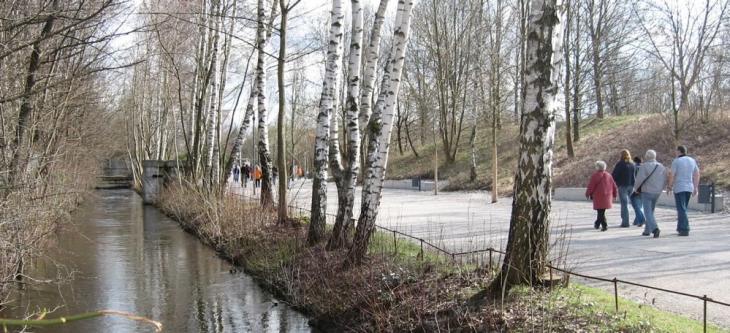
Beautiful Dachau (2006), 30-minute video installation practice-as-research, set in the town of Dachau, Germany. In Time of Place research project. Screenings and talks at Madison (2006), Brown (2007), Bryn Mawr (2007), Harvard (2007), Princeton (2007) and Swansea (2007).
Books
In preparation, The Documentary Image: Representations of Realism.
In preparation, In Time of Place: Memorializing the Holocaust, monograph on five practice-based films.
Visualizing the City, co-editor with Dietrich Neumann. London, Routledge, 2008. ISBN 978-0415419703.
Relocating Eden: The Image and Politics of Inuit Exile in the Canadian Arctic. Hanover, University Press of New England. 1995. Included in UPNE's Native American Studies Series, 1998. ISBN 0-87451-659-5.
Out In the Cold: The legacy of Canada's Inuit relocation experiment in the High Arctic. Copenhagen, IWGIA, 1992. ISSN 0105-6387.
Selected Articles and Book Chapters
‘Place With No Dawn – A Town’s Evolution and Erskine’s Arctic Utopia’, in R. Windsor Liscombe (ed.) Architecture and the Canadian Fabric. Vancouver, University of British Columbia Press, 2011: 283-310. ISBN 978-0-7748-1939-8.
'A Tale of Two Cities: Dachau and KZ Munich', in R. Koeck and L. Roberts (eds.) The City and the Moving Image. Houndmills, Palgrave Macmillan, 2010: 125-139. ISBN 978-0-230-24338-5. (pdf)
’Beautiful Dachau’s Contested Urban Identity’, in A. Marcus and D. Neumann (eds.) Visualizing the City, London, Routledge, 2008: 75-95. ISBN 978-0415419703.
‘The Interracial Romance as Primal Drama: Touch of Evil and Diamond Head’, Film Studies, Issue 11, (Winter) 2007: 14-26. ISSN 1469-0314. (pdf)
‘Spatial Transfigurations in beautiful Dachau’, The Journal of Architecture, Vol. 11, No. 5 (November) 2006: 531-541. ISSN 1360-2365.
‘Nanook of the North as Primal Drama’, Visual Anthropology, Vol. 19, Nos. 3-4, 2006: 201-222. ISSN 0894-9468. (pdf)
‘Looking Up: the child and the city’, History of Photography, Vol. 30, No. 2 (Summer), 2006: 119-133. ISSN 0308-7298. (pdf)
'Reappraising Riefenstahl’s Triumph of the Will', Film Studies, Issue 4, (Summer) 2004: 75-86. (pdf)
‘Uncovering an auteur: Fred Zinnemann’, Film History, Vol. 12, No. 1, 2000: 49-56. (pdf)
'Reflecting on Contested Images', in J.C.H. King. and H. Lidchi (eds.), Imaging the Arctic. London, British Museum Press, 1998: 190-6. ISBN 0-7141-2537-7.Keynotes, Invited Talks and Conference Contributions
Screening and discussion of The New Colossus, Visible Evidence XXVI conference, USC (2019).
Invited speaker, screening and discussion of Jack London and 216 Beach Walk, Waikiki, Huntington Library (2019) (pdf).
Graduation Address, University of Aberdeen (2019).
Screening with panel discussion of 216 Beach Walk, Waikiki, Jack London conference, University of Nevada, Las Vegas (2018).
Screening of The New Colossus and Q&A, The Incomers Film Festival, Dumfries (2018).
Invited speaker, screening with panel discussion of 216 Beach Walk, Waikiki, J20+ University of Hawaii (2018).
Video installation of 216 Beach Walk, Waikiki, Contact Exhibition, Honolulu Museum of Art School (2018).
Invited speaker, screening and discussion of Near the Palace, University of Hawaii (2018).
Invited speaker, screening and discussion of The Forgotten Jew in the City of Youth and In the Birch Grove, Alan D. Leve Center for Jewish Studies at UCLA (2018).
Invited speaker, screening and discussion of The New Colossus, in Los Angeles for a session of The Council on Foreign Relations (2018).
Screening and panel discussion of The New Colossus, University of Aberdeen (2017).
Invited speaker, Let's Go to Dachau!: the representation of tourism at an iconic site, and screening of In Place of Death, University of Iceland (2016).
Speaker, Representing Post-Traumatic Space, Resnais Archipelago conference, Duke University, Durham, NC (2015).
Invited speaker, screening and panel discussion of In the Birch Grove, Columbia University, NY (2015).
Invited speaker, screening and discussion of One Hot Day video installation, Sir Duncan Rice Library Gallery, University of Aberdeen (2015).
Invited speaker, Hiroshima: under the bomb 70 years on, screening and discusion of One Hot Day, Wolfson College, University of Cambridge (2015).
Invited speaker, Auschwitz: topography and affectivity of space, and screening of In the Birch Grove, Spaces of Memory and Performance conference, London (2014).
Invited speaker, Hiroshima: a filmic approach to a post-traumatic site, and screening of One Hot Day, University of Hawaii (2014).
Invited speaker, Rehabilitation of a Post-Traumatic Space, and screening of In Place of Death, University of Hawaii (2014).
Keynote speaker, Aestheticizing History on Film and screening of In the Birch Grove, Film, History and Public Memory conference, Derry, NI (2013).
Speaker, Snapshot Visual Ethnography, The Cemetery and Kafka’s Prague and screening of The Cemetery, Visible Evidence documentary conference, Stockholm (2013).
Keynote speaker, Thinking About Auschwitz in a Visual Context and screening of In the Birch Grove, Trauma and Memory conference, Portsmouth (2013).
Invited speaker, Auschwitz-Birkenau as Touristed Post-Traumatic Site and screening of In the Birch Grove, Brandeis University (2013).
Invited speaker, Auschwitz-Birkenau and its Visual Documentation and screening of In the Birch Grove, Brown University, Providence, RI (2013).
Invited speaker, Aspirational Architecture and Cultural Juxtapositions and screening of 85 Miles North of the Equator, Brown University (2013).
Invited speaker, Director’s Cut Masterclass on Filming Holocaust Sites and cinema screening at Belmont Picturehouse of In Place of Death and In the Birch Grove, in commemoration of Holocaust Memorial Day, Aberdeen City Council (2013).
Delivered Graduation Welcome Address for School of Language and Literature, University of Aberdeen (2013).
Screening of The Memorial, Society for Cinema and Media Studies annual conference, Boston (2012).
Invited speaker, Guernica Reconsidered in the Light of Day, and screening of One Market Day, History of Art Department, University of Aberdeen (2012).
Invited speaker, In the Birch Grove: filming at Auschwitz-Birkenau, and screening of In the Birch Grove, King's College London (2012).
Invited speaker, Recovering Meaning in an Iconic Urban Terrain and screening of One Market Day, at the FACT arts cinema, organized by the Centre for Architecture and Visual Arts, University of Liverpool (2011).
Invited speaker, Making Meaning from Memory, Film and Memory conference, University of Stirling (2011).
Invited speaker, The Fragility of Memory and screening of In Place of Death, Museum of the History of Polish Jews, Warsaw (2011).
Invited speaker, Dachau/Munich as a Conceptual Urban Space and screening of In Place of Death, Center for Holocaust Studies, Institute of European Studies, Jagiellonian University, Krakow, Poland (2011).
Plenary speaker, The Death of Six Million in Boston, and screening of The Memorial, Film, Philosophy and Death symposium, University of York (2011).
Invited speaker, Capturing Kafka: an observational glimpse, and screening of The Cemetery, University of York (2011).
Invited speaker, Frank Capra Fund Lecture, Dachau Today -- the concentration camp as tourist attraction and screening of In Place of Death, Caltech, Pasadena, CA (2011).
Invited speaker, The City Square as Stage: cum nimis absurdum and screening of The Ghetto, Caltech, Pasadena, CA (2011).
Invited speaker, Academic Vice-President’s Annual Lecture, Forgetting to Remember: the broken glass of historical assumptions and screening of In Place of Death, St. Francis Xavier University, Nova Scotia (2010).
Invited speaker, The Ghetto and the politics of place and screening of The Ghetto, St. Francis Xavier University, Nova Scotia (2010).
Invited speaker, Kristallnacht and Remembrance Day: a tale of two cousins, and screening of In Place of Death, St. Mary's University, Nova Scotia (2010).
Keynote speaker, A Film Practice Paradigm and screening of The Ghetto, Creative Conflicts, University of Dundee (2010).
Invited talk and screening of In Place of Death, Centre for Research in the Arts, Social Sciences and Humanities, University of Cambridge (2010).
Invited talk and screening of In Place of Death, Divinity School, University of Cambridge (2010).
Invited talk and screening of In Place of Death, Architecture School, University of Cambridge (2010).
Speaker, The Ghetto Unmapped and screening of The Ghetto, Mapping, Memory and the City conference, University of Liverpool (2010).
Invited talk, The New College: Erskine’s Utopian Design, Centre for Research in the Arts, Social Sciences and Humanities, University of Cambridge (2010).
Invited talk, Clare Hall and Erskine’s Utopian Architecture, Clare Hall, University of Cambridge (2010).
Invited speaker, The Ghetto as City Symphony, Urban Cinematics, Cambridge University (2009).
Invited speaker, Bodies on Display: gender ambiguities and Riefenstahl’s Olympia, John Carlisle-Irving Lecture, University of British Columbia, Vancouver (2009).
Invited speaker, In Time of Place and screening of In Place of Death, Centre for Transcultural Research and Media Practice, Dublin Institute of Technology (2009).
Invited speaker, A Survivor's Tale and Filming Contemporary Dachau, and screening of In Place of Death, University of Manchester (2008).
Invited speaker, When a Town is Called Dachau: urban reinvention and the stature of place and screening of In Place of Death, Manchester Architecture Research Centre (2008).
Invited speaker, The Holocaust: in harm’s way and screening of In Place of Death, University of Derby (2008).
Speaker, When We Forget: Dachau and the displacement of memory andscreening of In Place of Death, Visible Memories conference, Syracuse University, NY (2008).
Invited speaker, In Time of Place and screening of In Place of Death, Narrascape workshop, Dept of Architecture, University of Cambridge (2008).
Speaker, In Absence of Memory and screening of In Place of Death, Cultural Memory conference, University of Kent (2008).
Keynote Speaker, The Interface Between Architecture and Cinema and screening of In Place of Death, Symposium on Cinema and Architecture, Haifa, Israel (2008)
Invited Speaker, A Tale of Two Cities: Dachau Observed and screening of In Place of Death, City in Film conference, Liverpool University (2008).
Keynote Speaker, Without Voice, In Place of Death and screening of In Place of Death, Practice-as-research documentary symposium, Edinburgh College of Art (2008).
Invited Speaker, Sensory Applications in Observational Cinema and screening of Beautiful Dachau, Harvard University (2007).
Invited Speaker, Beautiful Dachau: the tourism paradox and screening of Beautiful Dachau, Princeton University (2007).
Invited Speaker, Filming ‘Beautiful Dachau’ and screening of Beautiful Dachau, Bryn Mawr College (2007).
Invited Speaker, Dachau’s Architectural and Urban Integration and screening of Beautiful Dachau, Brown University (2007)
Keynote Speaker, Beautiful Dachau: practice-as-research and screening of Beautiful Dachau, MEICAM Memory and Conflict conference, Swansea. (2007).
Speaker, Observing Contemporary Dachau on Film, Beyond Text conference, University of Manchester (2007)
Speaker, Spatial Transfigurations in Beautiful Dachau and screening of Beautiful Dachau, Trans Visual Culture international conference, University of Wisconsin, Madison (2006).
Speaker, Imaging Urban Youth: New York City in the 1930s/40s, Photography and the City conference, University College Dublin (2006).
Invited Speaker, Robert Flaherty’s Nanook of the North – the Sequel, Cambridge University Film Seminar, Centre for Research in the Arts, Social Sciences and Humanities, Cambridge(2006).
Deviser and Chair, Organizing Committee, Visualising the City, international conference, University of Manchester (2005).
Speaker, The Moral Divide: Riefenstahl & De Sica’s Urban Terrain, Visualising the City conference, University of Manchester (2005).
Speaker, Black Narcisus as Primal Drama, Michael Powell Centenary Conference, University of Wales, Bangor (2005).
Co-deviser and co-chair, Film Studies and the Popular, symposium, University of Manchester (2004).
Speaker, The Interracial Romance and Translucence of the Popular, Film Studies and the Popular symposium, University of Manchester (2004).
Invited speaker, Erskine’s Arctic Utopia, Interdisciplinary Cultural Studies lecture series, University of British Columbia (2003).
Invited plenary speaker, Films Without Words, international conference, Seeing Things, British Council, Tours, France (2001).
Invited plenary speaker, The Documentary Image, and chair of a day session at the ethnographic film festival, Emerging Voices, Isola del Cinema, Rome (2001).
Invited panel chair, National Identities, Alfred Hitchcock Centenary international conference, New York University (1999).
Invited paper, Robert Flaherty as Documentary Activist, Visible Evidence conference, University of California at Los Angeles (1999).
Invited speaker, Images of the Inuit, Scott Polar Research Institute, University of Cambridge (1999).
Two invited papers, 'Land of the Long Day' Revisited, and Relocating Eden, at the 10th Inuit Studies Conference, St. John's, Canada (1996).
Invited paper, Imaging the Ahiarmiut, conference held at The British Museum, Imagining the Arctic:the native photograph in Alaska, Canada and Greenland (1996).
Invited plenary speaker, Robert Flaherty's 'Nanook of the North', Media Studies Conference, University of Burgundy, Dijon (1995).
Panel participant in session on The docu-drama film, European Media Conference, Manchester University (1994).
Invited speaker, public lecture series, Canadian Inuit – a people's transition, the Royal Geographical Society, London (1994).
Invited speaker, Scott Polar Research Institute public lecture series, Utopia on trial:Canadian Royal Commission investigation of a relocation, University of Cambridge (1993).
Invited paper, Political moves:relocating Inuit to reaffirm sovereignty, at a conference on socio-cultural change in the Arctic at Aarhus University in Denmark (1993).
Presentation as a member of a working group on Environmental narratives in London organized by the U.S. Social Science Research Council (1992).
Invited paper, Canada and the Inuit:historical revisions and cultural divisions, the annual London Conference on Canadian Studies (1992).
Invited paper, Canadian Inuit relocation experiments, Scott Polar Research Institute (1992).
Panel participant, The Inuit, Resolute Bay and the government era, 8th Inuit Studies Conference in Quebec City, Canada (1992).
Invited speaker, the University Seminar on Northern Studies, Out in the cold:the legacy of Canadian Inuit relocation experiments, Dartmouth College, Hanover, New Hampshire (1992).
Invited speaker, The controversy over Canadian relocation experiments, Canadian Nordic Society, Ottawa (1992).
Knowledge Exchange
Organizer of the annual symposium of the Scottish Consortium for Film and Visual Studies, Within the Frame: integrating film practice and theory, University of Aberdeen in 2009.
Co-organizer with the History of Art Department and the Aberdeen Art Gallery of The Tartan Lens, a symposium on Scottish national identity in the visual arts, University of Aberdeen in 2009.
Co-director of the 10th Royal Anthropological Institute's Ethnographic Film Festival, University of Manchester in 2007.
Conference deviser and chair of the organizing committee of the Visualizing the City conference in 2005, which featured 180 speakers.
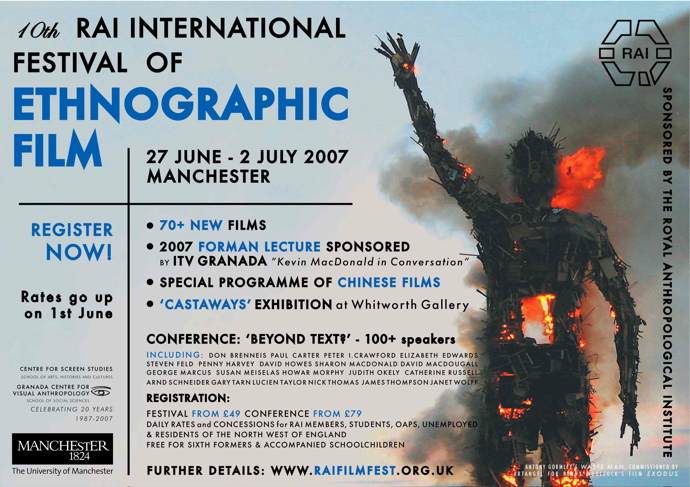
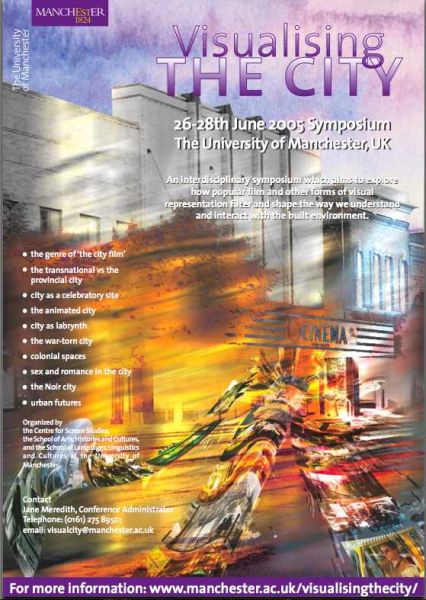
Originator and coordinator of The Director's Cut devised in 2007, a public talks series organised in collaboration with the University's External Affairs team that features leading and innovative filmmakers, broadcasters and visual artists. The series has presented over 50 main events and masterclasses attended by students, staff and members of the public. It has received wide spread press coverage, a number of its episodes have been broadcast on BBC Radio Scotland and most of the series is archived on The Director's Cut website as webcasts or podcasts. The Director's Cut follows on from the Visual Dialogues series developed with Prof. Paul Henley at the University of Manchester (2003-6). Events from the two series include:
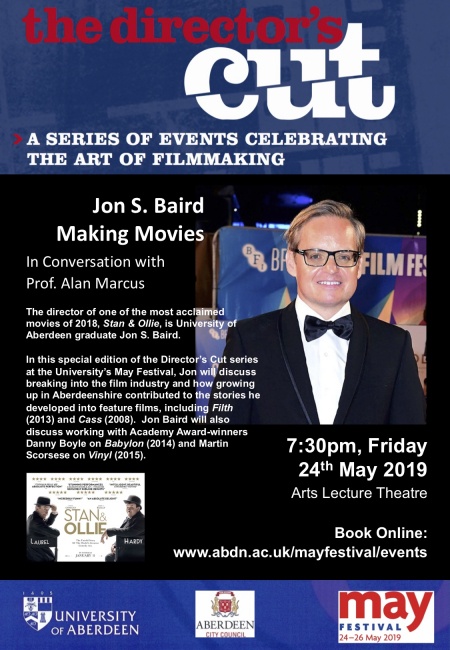
The director of one of the most acclaimed movies of 2018, Stan & Ollie, starring Steve Coogan and John C. Reilly, is a University of Aberdeen graduate. Jon Baird discusses breaking into the film industry and how growing up in Aberdeenshire contributed to the stories he developed into award-winning feature films, including: Filth(2013), a provocative black comedy crime film based on the novel by Irvine Welsh, and Cass (2008), a crime drama set in the world of football hooliganism. Baird will also discuss working with Academy Award-winners Danny Boyle on Babylon (2014) and Martin Scorsese on Vinyl (2015). Event Details. Additional Masterclass Session.
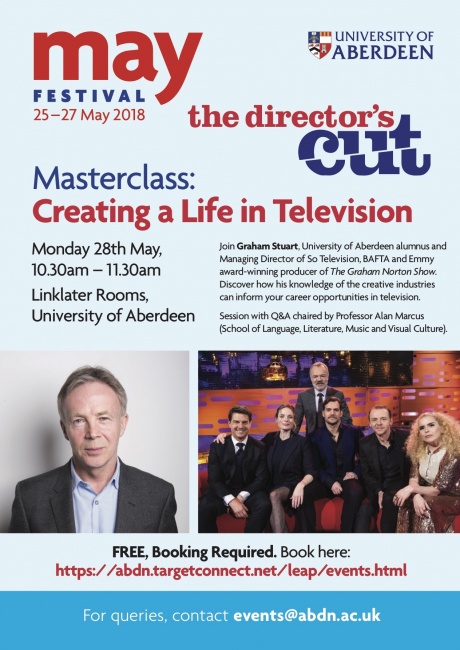
English Literature graduate from the University of Aberdeen and now Managing Director of So Television, Graham Stuart is the three-time BAFTA and Emmy award-winning producer of The Graham Norton Show. Stuart is also the new Executive Chairman of the Edinburgh Television Festival. Discover how his knowledge of the creative industries can inform your career opportunities in television. Event Details.
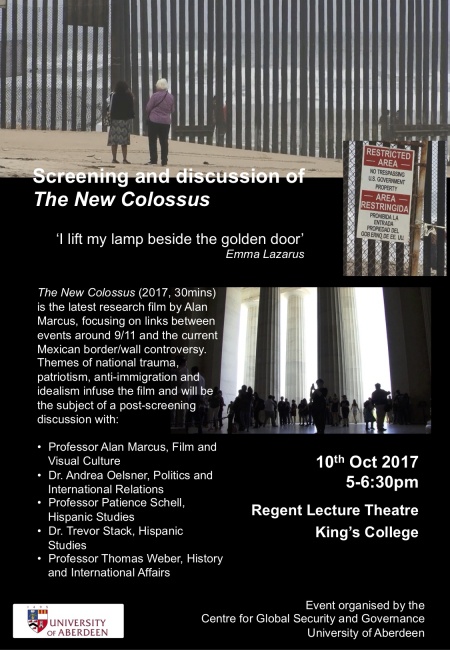
The New Colossus (2017) is the latest research film by Alan Marcus, which focuses on links between events around 9/11 and the current controversy over the US/Mexican border/wall. Themes of national trauma, patriotism, anti-immigration and idealism infuse the film and will be the subject of a post-screening discussion with: Prof. Alan Marcus, Dr. Andrea Oelsner (Politics and International Relations), Prof. Patience Schell (Hispanic Studies), Dr. Trevor Stack (Hispanic Studies), chaired by Prof. Thomas Weber (History and International Affairs). This collaborative event is hosted by the Centre for Global Security and Governance. Event Details.
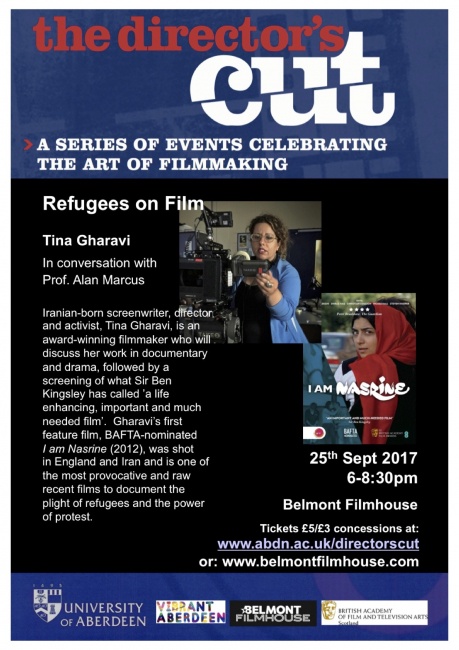
A special screening of the film, I am Nasrine (2012) and discussion with the award-winning screenwriter and director Tina Gharavi. Sir Ben Kingsley calls the work "a life enhancing, important and much needed film". During this event, Gharavi provides insight into a selection of her documentaries and dramas and I am Nasrine's production, from film shoots in Tehran to gathering stories of UK asylum seekers. Filmed in England and Iran, I am Nasrine was nominated for a BAFTA for outstanding debut and is one of the most provocative and raw recent films documenting the plight of refugees and the power of protest. Event Details. Additional Masterclass Session.
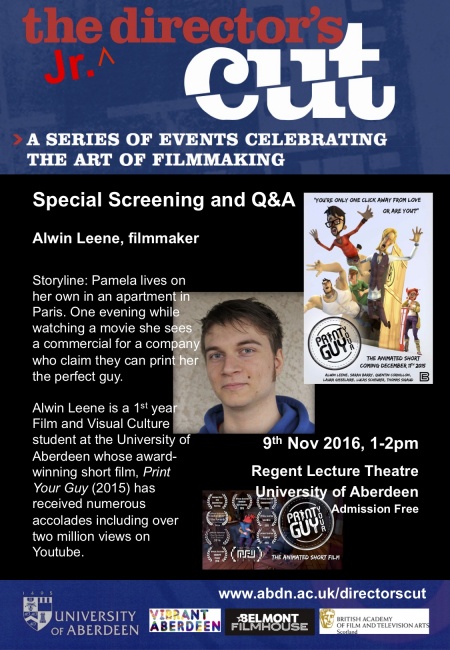
Alwin Leene is a 1st year Film and Visual Culture student at the University of Aberdeen whose award-winning short film, Print Your Guy, has received numerous accolades including over two million views on Youtube. Born in Groningen in the Netherlands, he moved to France, attended the Bellecour School of Art in Lyon and received a degree in CG animation. After working five months in the animation studio Superprod in Angouleme, he has come to the University of Aberdeen to further his studies on a four-year undergraduate degree in Film and Visual Culture. Print Your Guy has been selected for NanoCon, Kinematifest, The Global Short Awards, Doc Sunback Film Festival, Siggraph France, Kinofest, IndieWise, Minikino Film Week and it won the Chester Film Festival Audience Prize. Event Details.
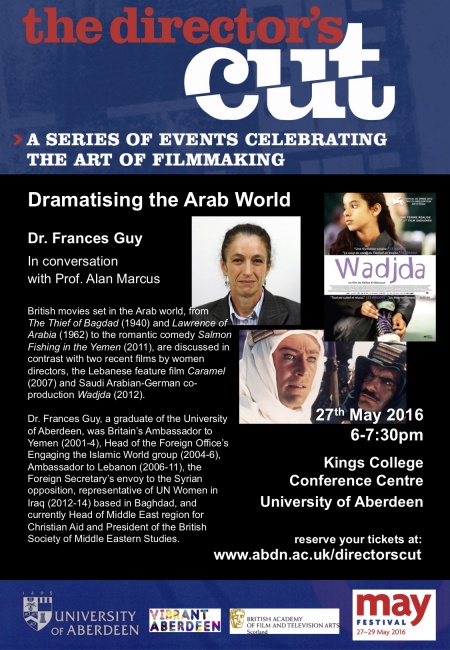
Discussing British movies set in the Arab world, from The Thief of Bagdad (1940) and David Lean's classic Lawrence of Arabia (1962) starring Peter O'Toole, to the romantic comedy Salmon Fishing in the Yemen (2011) featuring Ewan McGregor and Emily Blunt, set in contrast with two films by Arab women directors -- the award-winning Lebanese feature film Caramel (2007) by Nadine Labaki and the Saudi Arabian-German co-production Wadjda (2012) by Haifaa al-Mansour, this event will feature Middle East expert Frances Guy. A native of Edinburgh and graduate of the University of Aberdeen, Frances Guy was Britain’s Ambassador to Yemen (2001-4), Head of the Foreign Office’s Engaging the Islamic World group (2004-6), Ambassador to Lebanon (2006-11), the Foreign Secretary’s envoy to the Syrian opposition, representative of UN Women in Iraq (2012-14) based in Baghdad and President of the British Society of Middle Eastern Studies. Event Details.
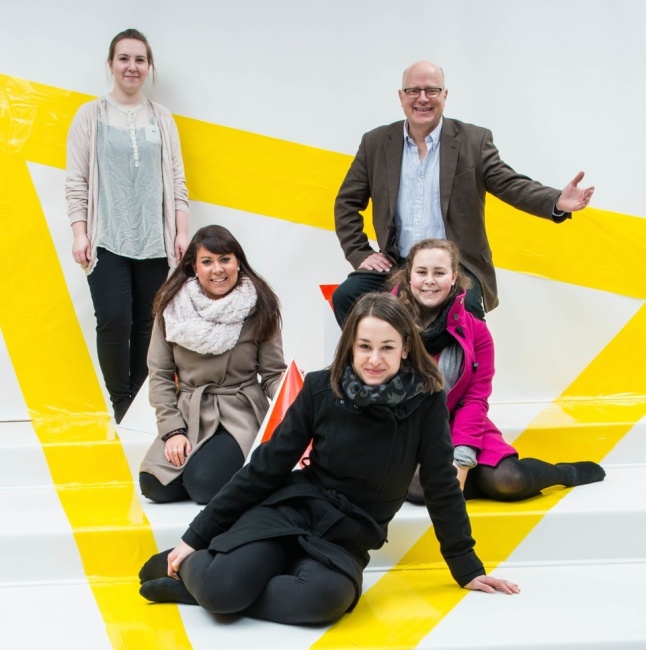
Join us for a selection of innovative and award-winning short films made by University of Aberdeen film students. The session includes experimental films made by students on local artists, and an audience Q&A chaired by Prof. Alan Marcus.We are pleased to welcome back to Aberdeen one of our recent graduates, Veronika Koubova, whose latest short film, Lemuria, has been winning awards and plaudits for its innovation. Event Details.
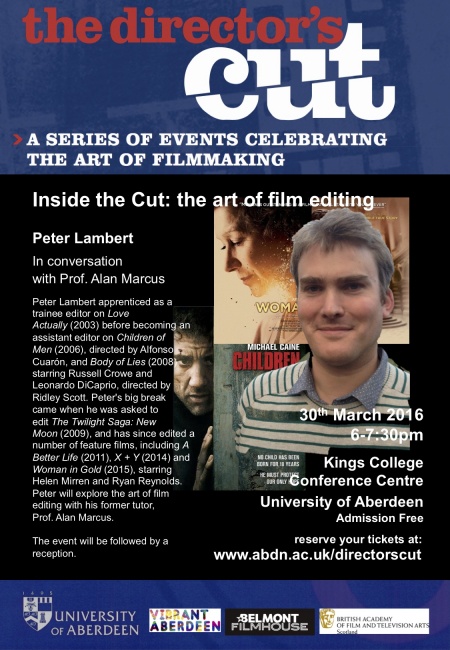
Peter Lambert apprenticed as a trainee editor on Love Actually (2003) before becoming an assistant editor on Children of Men (2006), directed by Alfonso Cuaron, and Body of Lies (2008) starring Russell Crowe and Leonardo DiCaprio, directed by Ridley Scott. Peter's big break came when he was asked to edit The Twilight Saga: New Moon (2009), and has since edited a number of movies, including A Better Life (2011), Woman in Gold (2015) starring Helen Mirren and Ryan Reynolds, The Death of Stalin (2017) and Mamma Mia! Here We Go Again (2018). Peter will explore the art of film editing and discuss career paths in the film industry with his former tutor, Prof. Alan Marcus. Event Details. Additional Masterclass Session.
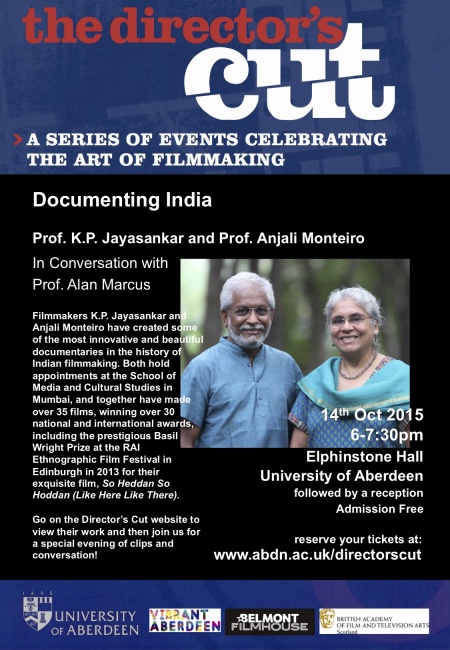
Professor K.P. Jayasankar and Professor Anjali Monteiro have created some of the most innovative and beautiful documentaries in the history of Indian filmmaking. Both hold appointments at the School of Media and Cultural Studies in Mumbai, and together have made over 35 films, winning over 30 national and international awards, including the prestigious Basil Wright Prize at the RAI Ethnographic Film Festival in Edinburgh in 2013 for their exquisite film, So Heddan So Hoddan (Like Here Like There). Their films present insightful studies that pose questions about the self and the other, normality and deviance. Other works include Identity: The Construction of Selfhood, which was awarded a prize at the Prix Futura Festival in Berlin and Saacha, an edited version of which was exhibited in 2013 at the Tate Modern in London. Their recent work includes the book, A Fly in the Curry: Independent Documentary Film in India (2015). Event and Webcast Details. Additional Masterclass Session.
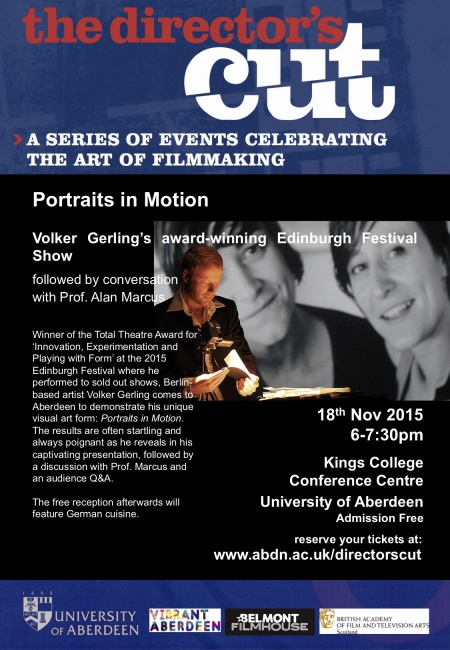
Following the success of his sold-out show at the 2015 Edinburgh Festival and winner of the Festival's Total Theatre Award for 'Innovation, Experimentation and Playing with Form', Berlin-based artist Volker Gerling comes to Aberdeen to demonstrate his unique visual art form: Portraits in Motion. Volker has reinvented a personalized way of coupling the power of the still image with the adventure of movement, producing unexpected results. In order to obtain his subjects, he has walked over 3,500km around Europe, seeking out interesting people with engaging stories to portray, while spending his nights in a tent. Unusually, he does not take money with him on his months-long photographic journeys, but exhibits his artistic work en route and once a week selects a subject to feature in a ‘flipbook’. Event and Webcast Details. Additional Masterclass Session.
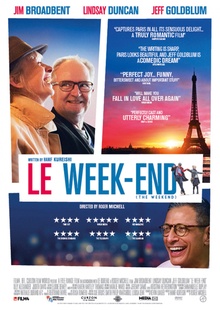
Following a successful stint at the Royal Shakespeare Company and his BAFTA-winning Jane Austen adaptation Persuasion (1995), Roger Michell achieved international acclaim with the box office smash Notting Hill (1999), starring Hugh Grant and Julia Roberts. His films include Changing Lanes (2002) starring Ben Affleck, Toni Collette and Samuel Jackson, The Mother (2003) with Daniel Craig and Anne Reid, Enduring Love (2004) adapted from the Ian McEwan novel, Venus (2006) starring Peter O’Toole and Jodie Whittaker, and Morning Glory (2010) with Rachel McAdams, Harrison Ford and Diane Keaton. We will also explore his films Hyde Park on Hudson (2012) with Bill Murray as President of the United States, Le Week-End (2013) starring Jim Broadbent and Lindsay Duncan and his BAFTA award-winning mini-series, The Lost Honour of Christopher Jefferies (2014). Event and Webcast Details. Additional Masterclass Session.
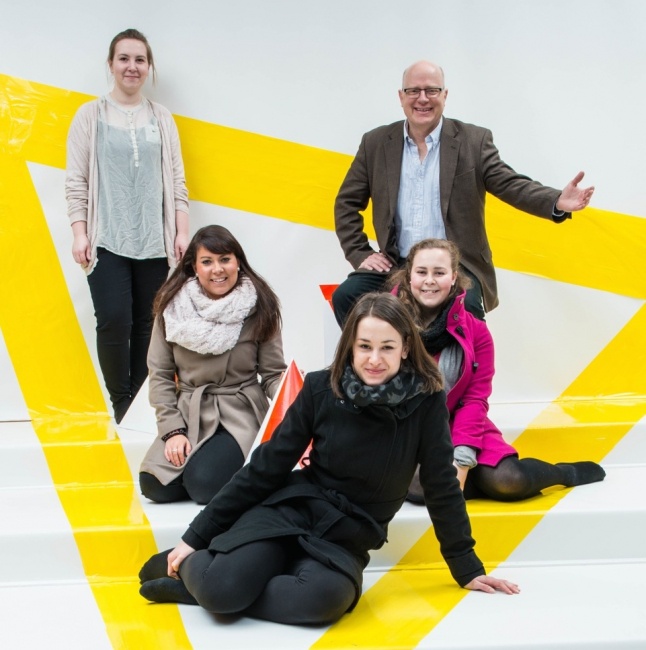
This event features an exciting selection of innovative short films made by University of Aberdeen film students. The screenings are followed by a Q&A with the filmmakers and include, We Sit, We Drink. No Guns, by Nicci Thompson, who graduated from the programme in 2012, and has just returned from the Cannes Film Festival this month where his film was selected for screening. We will also be viewing the film Flight which has been chosen for a special screening at a European film festival in June, made by students on our Documentary course. Another student film, Show Time, made as part of Laurent Prim’s final year film dissertation features the actress Vicky Krieps, known for her performances in Hanna (2011) and A Most Wanted Man (2014). Laurent's film and dissertation were awarded the Film and Visual Culture Department's Guy Hamilton Prize. Event Details.
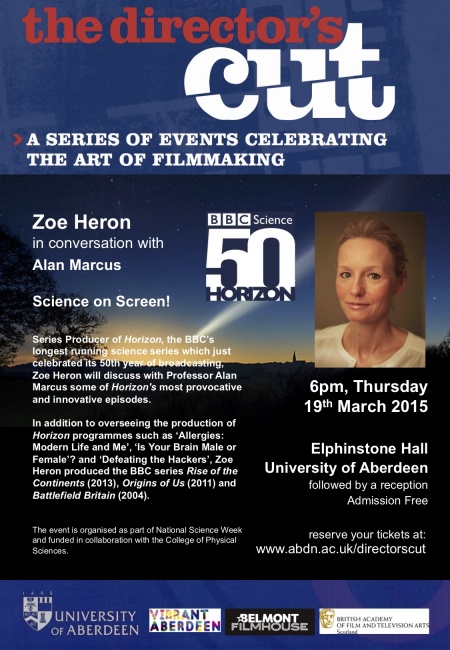
In an interest to investigate the ways science-related subjects are presented on television, we are pleased to invite Zoe Heron, Series Producer of Horizon, the BBC’s longest running popular science series. Horizon has just celebrated its 50th year of broadcasting and this event will delve into some of Horizon's most provocative and innovative episodes Heron and her colleagues have produced. In addition to overseeing the production of Horizonprogrammes such as ‘Allergies: Modern Life and Me’, ‘Is Your Brain Male or Female’?, ‘What’s Wrong with our Weather?’ and ‘Defeating the Hackers’, Zoe Heron produced the BBC series Rise of the Continents (2013), Origins of Us (2011) and Battlefield Britain (2004). This event is organised in conjunction with National Science Week and funded in collaboration with the University’s College of Physical Sciences. Event and Webcast Details. Additional Masterclass Session.
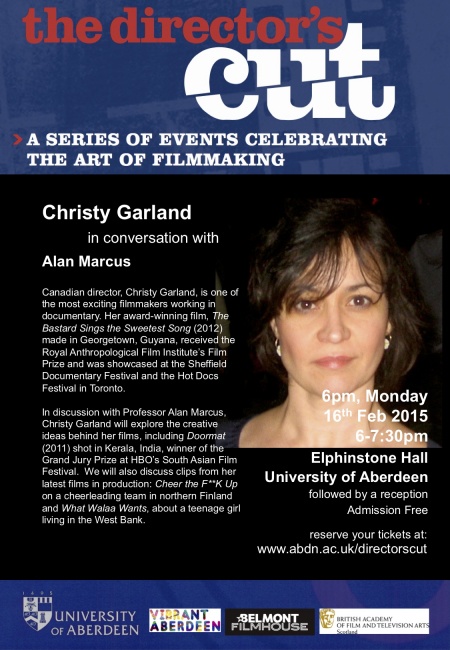
Canadian director, Christy Garland’s award-winning film, The Bastard Sings the Sweetest Song (2012) made in Georgetown, Guyana, received the Royal Anthropological Film Institute Film Prize at the International Festival of Ethnographic Film in Edinburgh and was showcased at the Sheffield Documentary Festival and the Hot Docs Festival in Toronto. In this Director’s Cut Garland explores the creative ideas behind this extraordinary film and her earlier work, Doormat (2008), shot in Kerala, India, and winner of the Grand Jury Prize at HBO’s South Asian Film Festival. We will also discuss her recent films: Cheer Up (2016) on a cheerleading team in northern Finland, and What Walaa Wants (2018), about a teenage girl living in the West Bank. Event and Webcast Details. Additional Masterclass Session.
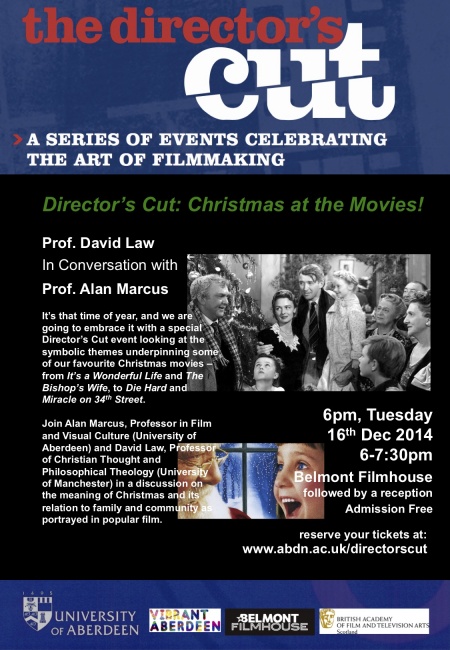
It’s that time of year, and we are going to embrace it with a special Director’s Cut event looking at the symbolic themes underpinning some of our favourite Christmas movies — from It’s a Wonderful Life and The Bishop’s Wife to Die Hard and Miracle on 34th Street. Join Alan Marcus and David Law, Professor of Christian Thought and Philosophical Theology (Univ. of Manchester), in a discussion on the meaning of Christmas and its relation to family and community as portrayed in popular film. Event and Podcast Details.
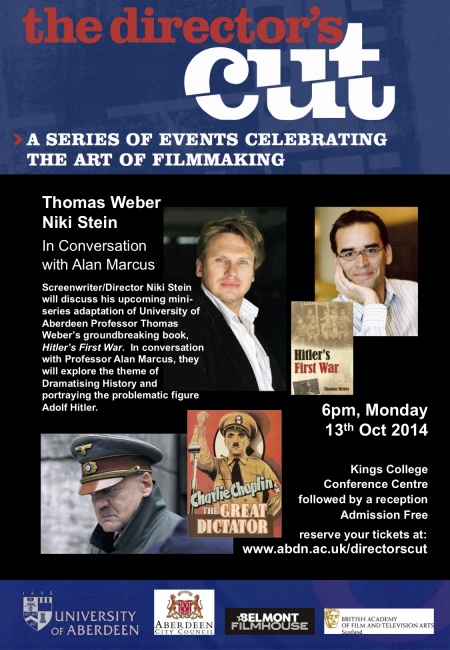
In 2010, Professor Thomas Weber at the University of Aberdeen published a ground-breaking text, Hitler’s First War, which is being turned into an eight-part German television series, filmed in English and adapted by award-winning German screenwriter/director, Niki Stein. This discussion will focus on historical dramatizations which have portrayed the problematic figure of Adolf Hitler, from Chaplin's The Great Dictator (1940) to Downfall (2004) and Hitler: the Rise of Evil (2003) featuring Scottish star Robert Carlyle in the central role. The event is co-funded through the Principal's Prize for Public Engagement with Research awarded to Professor Weber. Event and Webcast Details.
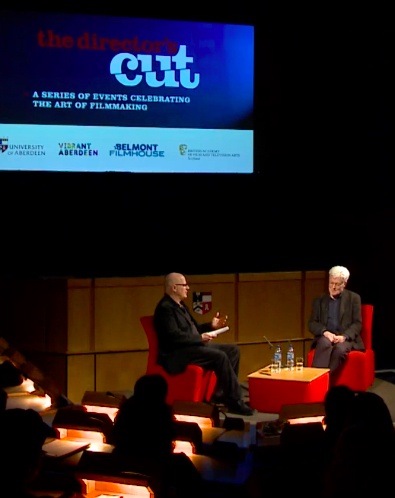
This May Festival event presents insight into the world of cinema through the expertise of David Gritten, one of the most internationally influential film journalists. Since the birth of movies, film critics and journalists have played a pivotal role in the interface between the industry, the public and film scholarship. For the last 40 years, Gritten has written regularly for The Telegraph, The Los Angeles Times and The New York Times and authored books on film and the cult of celebrity. In this event draws on interviews he has conducted with leading filmmakers and actors, such as Steven Spielberg, Martin Scorsese, Meryl Streep and others to discuss five key films and artists that have changed the face of cinema, and the controversial role of celebrity and its excesses in popular culture. Event and Webcast Details. Additional Masterclass Session.
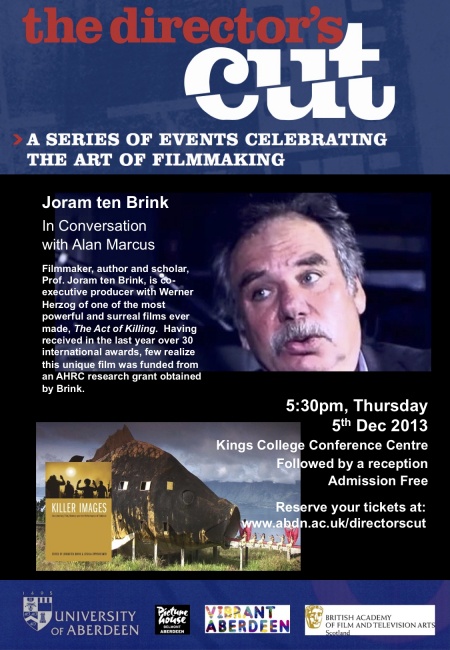
Professor Joram ten Brink is Director of the Centre for Production and Research in Documentary Film at the University of Westminster. He is also executive producer alongside Werner Herzog, Errol Morris and Andre Singer of The Act of Killing(2012), directed by Joshua Oppenheimer. Despite the film's winning over 30 international awards, few people are aware that this landmark documentary started as an academic research project funded by a £420K AHRC grant overseen by Brink. In addition to producing and directing a number of documentaries and experimental films, including Jacoba(1988) and Journey Through the Night (2004), Brink is the author of Building Bridges: the cinema of Jean Rouch (2008) and Killer Images: documentary film, memory and the performance of violence (2013). Event and Webcast Details.
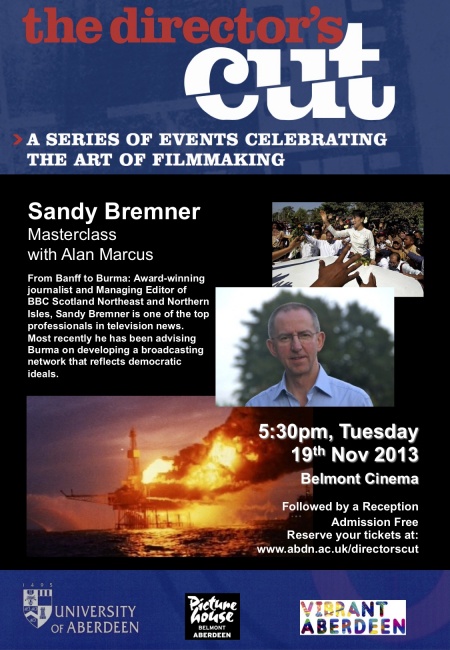
Following the political change in Myanmar, the international development charity, BBC Media Action, was asked to assist in the creation of the country’s new public broadcasting network, and the individual they chose to advise was Sandy Bremner. BBC Scotland's Managing Editor for the Northeast and Northern Isles was born in Banff and is a graduate of the University of Aberdeen. Bremner was an investigative reporter for the Press and Journal, winning Scotland's Young Journalist of the Year award, before joining the BBC. In this Masterclass, he talks about his role in stories on the Orkney child abuse inquiry, the Piper Alpha tragedy, Hong Kong's handover to China, Diana's fatal crash and his activities in Burma. Event Details.
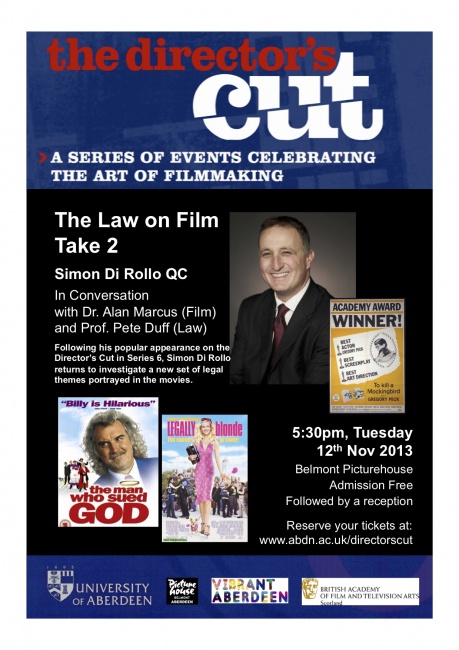
From 'Acts of God', as featured in Billy Connelly's The Man Who Sued God (2001), to corporate polluters and 'toxic torts' in John Travolta's A Civil Action(1998), leading QC, Simon Di Rollo, returns to the Director's Cut to cross-examine hit movies that focus on the law. This event is held at the Belmont Cinema as part of our Masterclass community outreach programme in collaboration with the University’s Law School. Event Details.
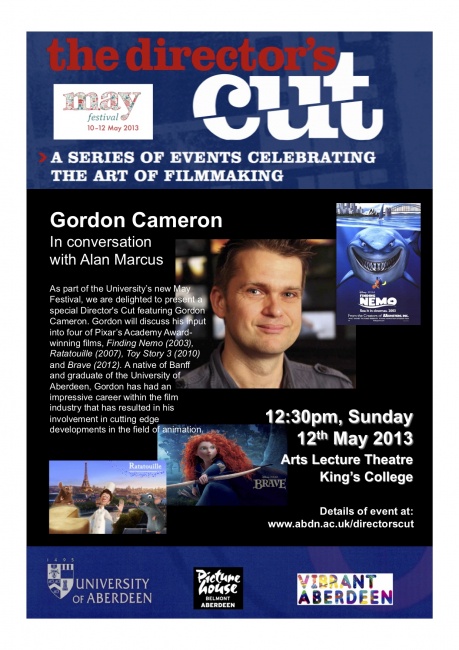
Working at Pixar Animation Studios since 2002, Gordon Cameron has been part of the team that created the Academy Award-winning films Finding Nemo (2003), Ratatouille(2007), Toy Story 3 (2010) and Brave (2012). A native of Banff and graduate of the University of Aberdeen who originally trained as a software developer, Cameron has had an impressive career within the film industry that has resulted in his involvement in cutting edge developments in the field of animation and some of its biggest hits. Event Details.
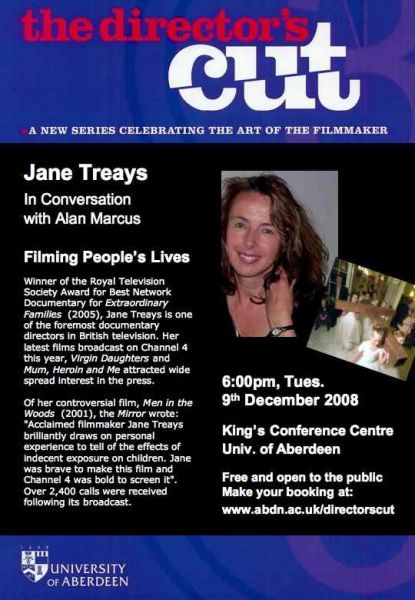
Winner of the Royal Television Society Award for Best Network Documentary for Extraordinary Families (2005), Jane Treays has for 25 years been one of the leading documentary directors in British television. Films broadcast on Channel 4 such as, Virgin Daughters and Mum, Heroin and Me, and BBC productions such as What Sort of Gentleman are you After?, have attracted widespread interest in the press. The Independent observed that her ‘work underlines the strength of the documentary as a television format'. Treays remarks, 'I've always been passionate about communities that live on the edge and are unspoken for'. Event Details.
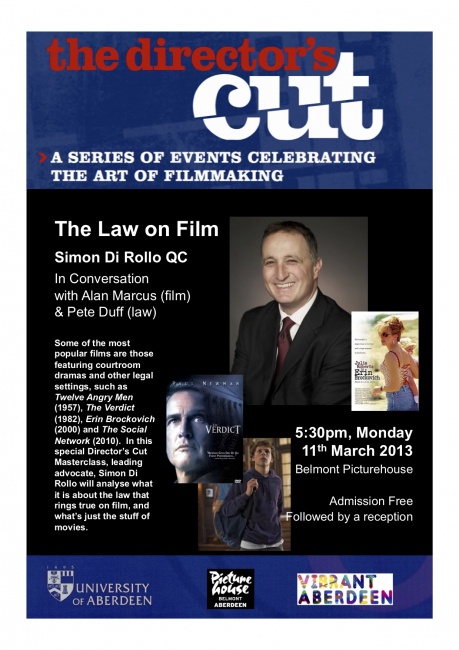
Some of the most popular films are those featuring courtroom dramas and other legal settings, such as Twelve Angry Men (1957), The Verdict (1982), Erin Brockovich (2000) and The Social Network (2010). In this special Director's Cut Masterclass, leading advocate, Simon Di Rollo QC, will analyse what it is about the law that rings true on film, and what's just the stuff of movies. One of Scotland's most high-profile court practitioners, Simon Di Rollo has argued a number of important cases before the Court of Session, the Sheriff Court, the High Court of Justiciary and General Medical Council tribunals. Di Rollo has also represented three leading cases involving the European Convention on Human Rights in the House of Lords. This event is in collaboration with the University’s Law School. Event Details.
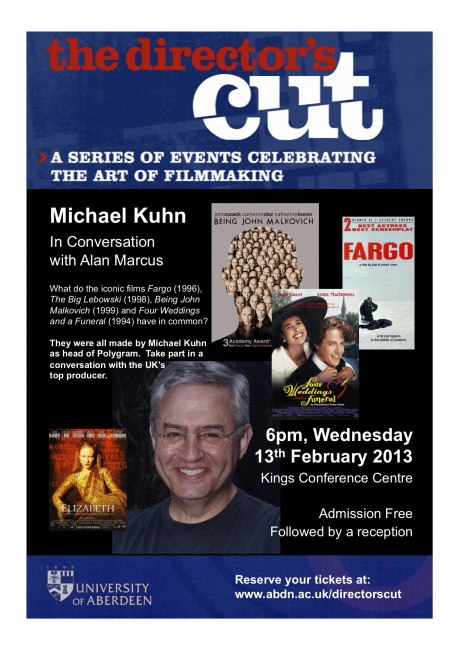
Michael Kuhn is one of the most important producers in contemporary British cinema. In 1991, he set up Polygram Film Entertainment, which made and distributed over 100 feature films and which between them won 14 Academy Awards. These films include Four Weddings and a Funeral, Notting Hill, The Big Lebowski, Dead Man Walking, Fargo, Lock Stock and Two Smoking Barrels, Elizabeth, Trainspotting and Being John Malkovich. Productions made subsequently by his company, Qwerty Films, include Kinsey and The Duchess. Michael Kuhn's book, 100 Films and a Funeral (2001) tells the extraordinary story of the rise and fall of Polygram. This event is held in collaboration with the University's Business School. Event and Webcast Details.
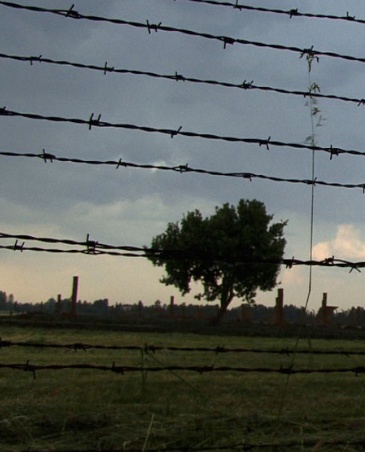
Prof. Alan Marcus, Head of Film and Visual Culture at the University of Aberdeen, will present two 30-minute films he directed that relate to sites associated with the Holocaust: In Place of Death (2008) and In the Birch Grove (2012). The films explore the contemporary settings of Dachau and Auschwitz, which attract significant visitor numbers, and the role of memory. The event, which includes a Q&A, is in collaboration with Aberdeen City Council's commemoration of Holocaust Memorial Day. Event Details.
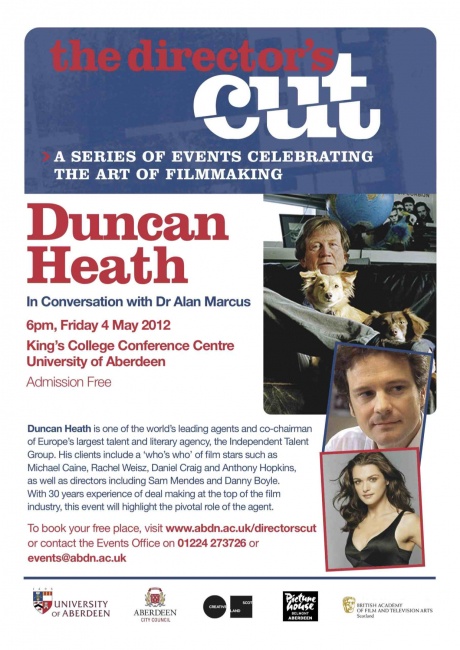
Duncan Heath is one of the world’s leading agents and head of Europe'’s largest talent and literary agency, the Independent Talent Group, based in London. His clients includes a ‘who’s who’ of film stars, such as Michael Caine, Rachel Weisz, Daniel Craig, Colin Firth, Maggie Smith, Anthony Hopkins, Gary Oldman and Ben Kingsley, as well as directors Sam Mendes, Danny Boyle and Mike Newell. His model agency represents Naomi Campbell, Iman and Elizabeth Hurley. Son of the Battle of Britain Spitfire ace, Sir Barrie Heath, Duncan studied law and then got his start at the William Morris Agency. In this Director’s Cut we will discuss the pivotal role of the agent and how the deals for some of the best known films were put together. Event and Podcast Details.
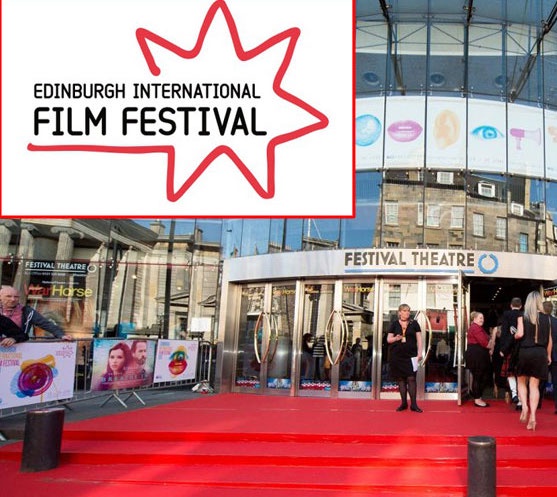
Ken Hay is the current Chief Executive Officer of the Edinburgh International Film Festival, which is world renowned for discovering and promoting the very best in international cinema, as well as heralding and debating changes in global filmmaking. He was Chief Executive of Scottish Screen (2005-10), the national development agency for the screen industries in Scotland, before joining the Edinburgh Film Festival in 2011. This Masterclass is a joint venture between the University's Business School and Film and Visual Culture Department and the goal of the series is to bring leading filmmakers and industry figures to Aberdeen to engage in a high-profile public exploration and discussion of their work. Event Details.
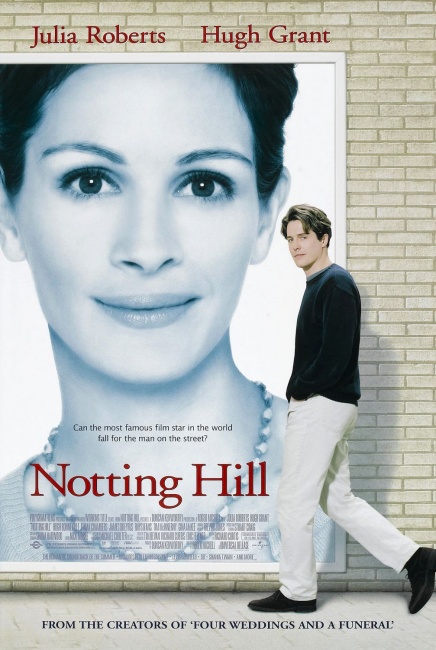
Malcolm Ritchie is a University of Aberdeen graduate who has enjoyed a successful career in London and Los Angeles and has been involved in overseeing the production of more than 100 films, including Trainspotting, Four Weddings and a Funeral and Notting Hill. He is currently partner or director in four media companies, including Tern, a leading UK television and digital production company based in Scotland. During his time as Chief Operating Officer at Polygram Films he was responsible for overseeing a large number of highly successful productions, including Lock, Stock and Two Smoking Barrels, The Hudsucker Proxy, Dead Man Walking, Bean, The Big Lebowski, Elizabeth and many more. Event Details.
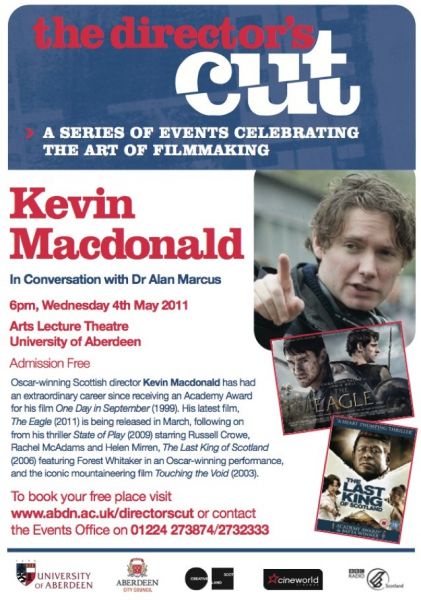
Oscar-winning Scottish director Kevin Macdonald has had an extraordinary career since receiving an Academy Award for his film One Day in September (1999). His film, The Eagle (2011), follows on from his thriller State of Play (2009) starring Russell Crowe, Rachel McAdams and Helen Mirren, The Last King of Scotland (2006) featuring Forest Whitaker in an Oscar-winning performance, and the iconic mountaineering film Touching the Void (2003). Macdonald also made the experimental film, Life in a Day: the Story of a Single Day on Earth (2011), culled from 80,000 Youtube videos and premiered at the Sundance Film Festival. Event and Webcast details.
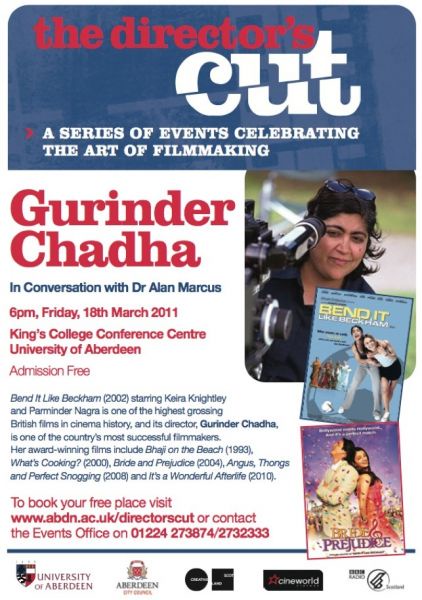
Bend It Like Beckham (2002) starring Keira Knightley and Parminder Nagra is one of the highest grossing British films in cinema history, and its director, Gurinder Chadha, is one of the country's most successful directors. Her award-winning films include Bhaji on the Beach (1993), What's Cooking? (2000), Bride and Prejudice (2004), Angus, Thongs and Perfect Snogging (2008) and It's a Wonderful Afterlife (2010). She was awarded an OBE in 2006. In this Director's Cut, Gurinder Chadha discusses the themes which infuse her narrative blend of comedy and drama, and the cultural territory her films traverse. Event and Webcast Details.
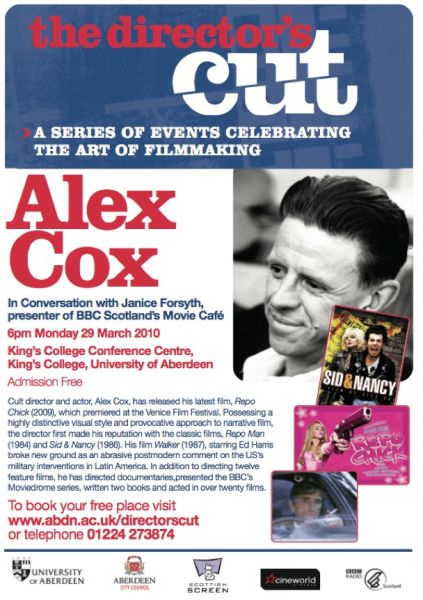
Alex Cox in conversation with Janice Forsyth, 29 March 2010
Cult director and actor Alex Cox has released his latest film, Repo Chick (2009), which premiered at the Venice Film Festival. Possessing a highly distinctive visual style and provocative approach to narrative film, the director first made his reputation with the classic films Repo Man (1984) and Sid & Nancy (1986). His film Walker (1987), starring Ed Harris, broke new ground as an abrasive postmodern comment on the USA's military interventions in Latin America. In addition to directing twelve feature films, as well as documentaries and presenting the BBC's Moviedrome series and acting in over twenty films, Alex Cox has written perceptive books on the Spaghetti Western, 10,000 Ways to Die (2008), and X Films: True Confessions of a Radical Filmmaker (2008). Alex Cox is interviewed by BBC Movie Café Presenter Janice Forsyth. Event and Webcast Details.
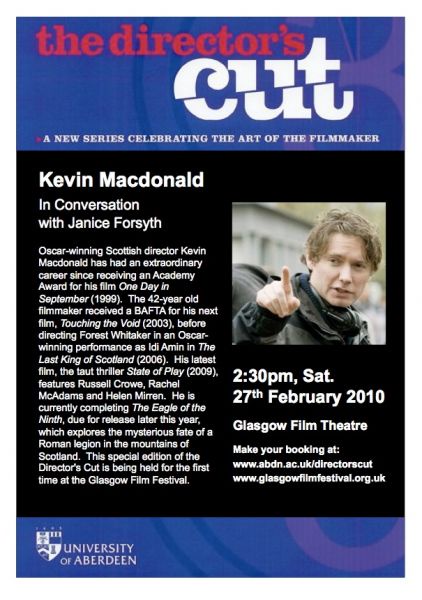
Kevin Macdonald in conversation with Janice Forsyth, 27 February 2010
Oscar-winning Scottish director Kevin Macdonald has had an extraordinary career since receiving an Academy Award for his film One Day in September (1999). Establishing a strong track record in documentaries and feature films, the 42-year old filmmaker received a BAFTA for his next film, Touching the Void (2003), before directing Forest Whitaker in an Oscar-winning performance as Idi Amin in The Last King of Scotland (2006). His latest film, the taut thriller State of Play (2009) features Russell Crowe, Rachel McAdams and Helen Mirren. Kevin Macdonald is interviewed by BBC presenter Janice Forsyth in this special edition of the Director's Cut being held for the first time at the Glasgow Film Festival. Event and Podcast Details.
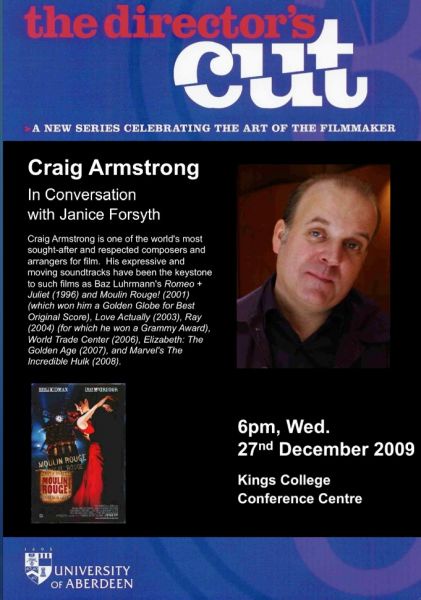
Craig Armstrong is one of the world's most sought-after and respected composers and arrangers for film. His expressive and moving soundtracks have been the keystone to such films as Baz Luhrmann's Romeo + Juliet (1996) and Moulin Rouge! (2001) (which won him a Golden Globe for Best Original Score), Love Actually (2003), Ray (2004) (for which he won a Grammy Award), World Trade Center (2006), Elizabeth: The Golden Age (2007), and Marvel's The Incredible Hulk (2008). Craig Armstrong is interviewed by BBC Movie Café Presenter Janice Forsyth. Event and Podcast Details.
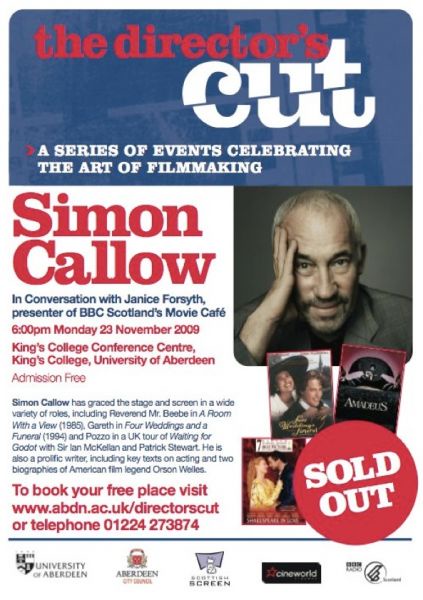
Simon Callow has been gracing the big screen in a wide variety of roles since his film debut in 1984 as Schikaneder in Amadeus, but, it was as the character Reverend Mr. Beebe in A Room With a View (1985) and as Gareth in Four Weddings and a Funeral (1994) that he became known to wider audiences. In 2009, he starred as Pozzo in a UK tour of Waiting for Godot by Samuel Beckett with Sir Ian McKellan and Patrick Stewart. As well as his numerous successes as an actor and director, Callow is also a prolific writer, including key texts on acting and two biographies of American film legend Orson Welles. Simon Callow is interviewed by BBC Movie Café Presenter Janice Forsyth. Event and Webcast Details.
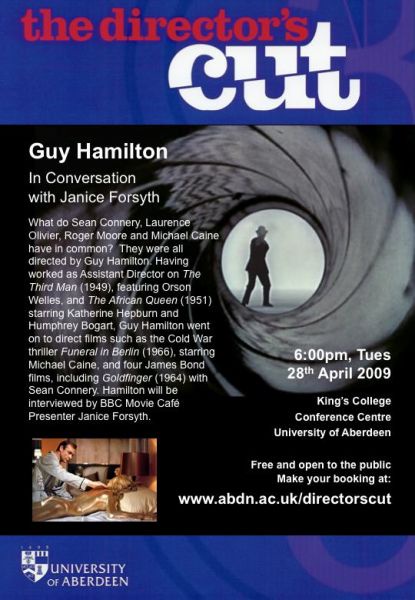
What do Sean Connery, Laurence Olivier, Roger Moore and Michael Caine have in common? They were all directed by Guy Hamilton (1922-2016). Having worked as Assistant Director on The Third Man (1949), featuring Orson Welles, and The African Queen (1951) starring Katherine Hepburn and Humphrey Bogart, Guy Hamilton went on to direct films such as the Cold War thriller Funeral in Berlin (1966), starring Michael Caine, and four James Bond films, including Goldfinger (1964) with Sean Connery. In this 2009 event, Guy Hamilton is interviewed by BBC Movie Café Presenter Janice Forsyth. Event and Webcast Details.
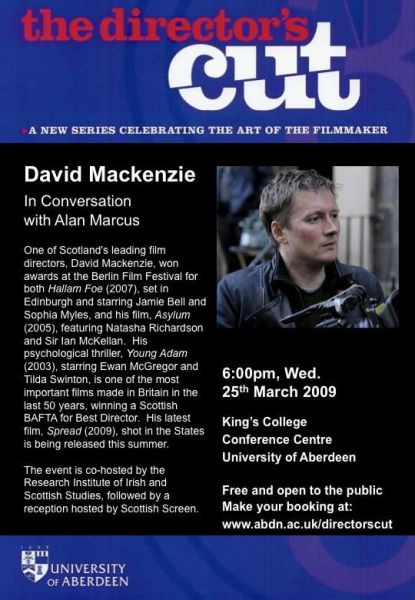
One of Scotland's leading film directors, David Mackenzie, won awards at the Berlin Film Festival for both Hallam Foe (2007), set in Edinburgh and starring Jamie Bell and Sophia Myles, and his film, Asylum (2005), featuring Natasha Richardson and Sir Ian McKellan. His psychological thriller, Young Adam (2003), starring Ewan McGregor and Tilda Swinton, is one of the most important films made in Britain in the last 50 years, winning a Scottish BAFTA for Best Director. His latest film, Spread (2009), shot in the States is being released this summer. Event and Webcast Details.
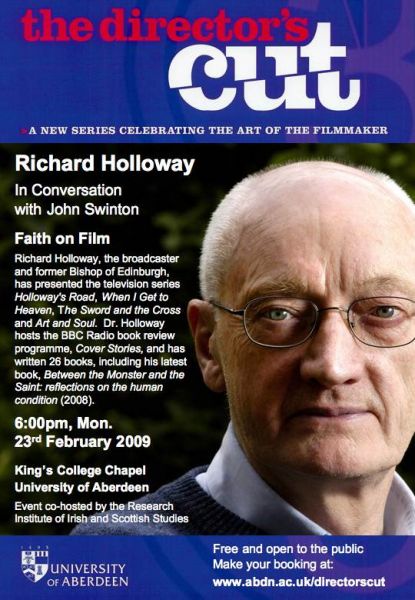
Richard Holloway, the broadcaster and former Bishop of Edinburgh, will feature in this special event of ‘the Director’s Cut at the Chapel’. Richard Holloway's television series include Holloway's Road, When I Get to Heaven, The Sword and the Cross and Art and Soul. Holloway hosts the BBC Radio book review programme, Cover Stories, and has written 26 books, including Between the Monster and the Saint: reflections on the human condition (2008). Event Details.

Winner of the Royal Television Society Award for Best Network Documentary for Extraordinary Families (2005), Jane Treays is one of the foremost documentary directors in British television. Her latest films broadcast on Channel 4 this year, Virgin Daughters and Mum, Heroin and Me attracted wide spread interest in the press. Of her controversial film, Men in the Woods (2001), the Mirror wrote: "Acclaimed filmmaker Jane Treays brilliantly draws on personal experience to tell of the effects of indecent exposure on children. Jane was brave to make this film and Channel 4 was bold to screen it". Over 2,400 calls were received following its broadcast. Event and Webcast Details.
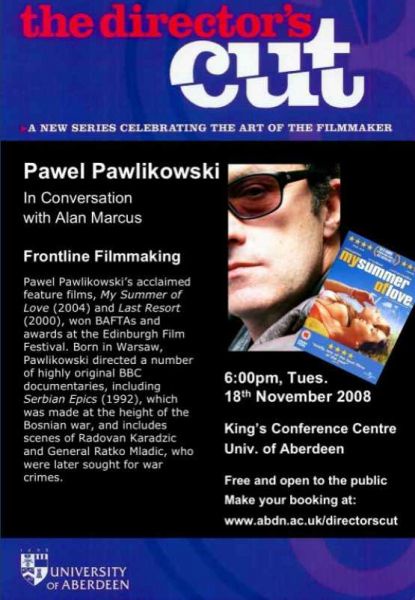
Pawel Pawlikowski’s acclaimed feature film, Ida (2015) won the Academy Award for Best Foreign Film, and his film, Cold War (2018), won the Best Director's Prize at the Cannes Film Festival. His films, My Summer of Love (2004) and Last Resort (2000), won BAFTAs and awards at the Edinburgh Film Festival. Born in Warsaw, Pawlikowski directed a number of highly original BBC documentaries, including Serbian Epics (1992), which was made at the height of the Bosnian war, and includes scenes of Radovan Karadzic and General Ratko Mladic, who were later sought for war crimes. Event and Webcast Details.
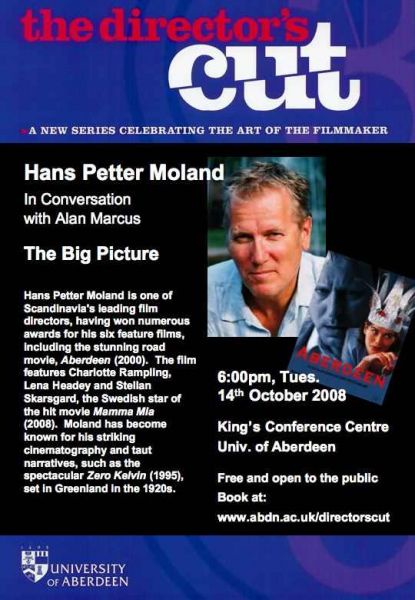
Hans Petter Moland is one of Scandinavia's leading film directors, having won numerous awards for his six feature films, including the stunning road movie, Aberdeen (2000). The film features Charlotte Rampling, Lena Headey and Stellan Skarsgard, the Swedish star of the hit movie Mamma Mia (2008). Moland has become known for his striking cinematography and taut narratives, such as the spectacular Zero Kelvin (1995), set in Greenland in the 1920s. Event and Webcast Details.
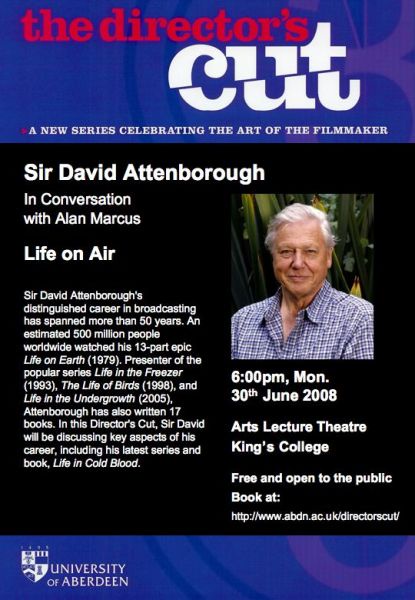
Sir David Attenborough's distinguished career in broadcasting has spanned more than 50 years. An estimated 500 million people worldwide watched his 13-part epic Life on Earth (1979). Presenter of the popular series Life in the Freezer (1993), The Life of Birds (1998), and Life in the Undergrowth (2005), Attenborough has also written 17 books. In this Director's Cut, Sir David discusses key aspects of his career, including his latest series and book, Life in Cold Blood. Event and Webcast Details.
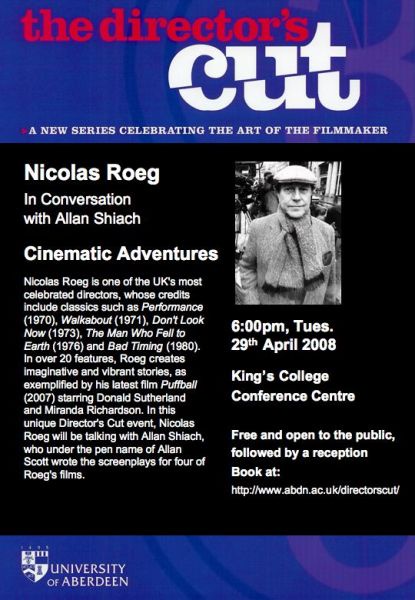
Nicolas Roeg (1928-2018) was one of the UK's most celebrated directors, whose credits include classics such as Performance (1970), Walkabout (1971), Don't Look Now (1973), The Man Who Fell to Earth (1976) and Bad Timing (1980). In over 20 features, Roeg creates imaginative and vibrant stories, as exemplified by his latest film Puffball (2007) starring Donald Sutherland and Miranda Richardson. In this Director's Cut event, Nicolas Roeg talks with Allan Shiach, who under the pen name of Allan Scott wrote the screenplays for four of Roeg's films. Event and Podcast Details.
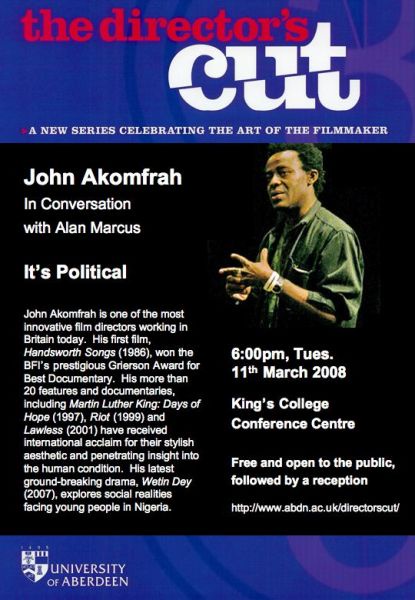
John Akomfrah is one of the most innovative film directors working in Britain today. His first film, Handsworth Songs (1986), won the BFI’s prestigious Grierson Award for Best Documentary. His more than 20 features and documentaries, including Martin Luther King: Days of Hope (1997), Riot (1999) and Lawless (2001) have received international acclaim for their stylish aesthetic and penetrating insight into the human condition. His latest ground-breaking drama, Wetin Dey (2007), explores social realities facing young people in Nigeria. Event and Podcast Details.
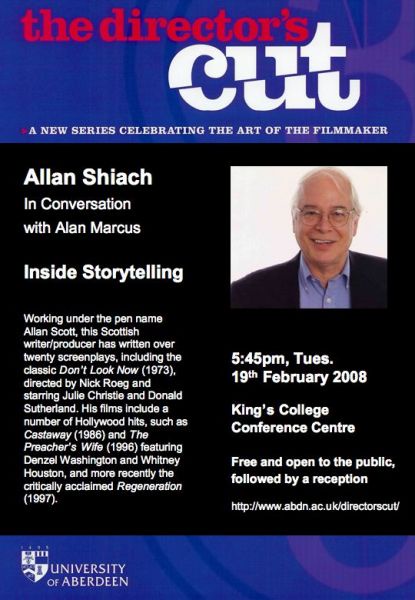
Working under the pen name Allan Scott, this Scottish writer/producer has written over twenty screenplays, including the classic Don’t Look Now (1973), directed by Nick Roeg and starring Julie Christie and Donald Sutherland. His films include a number of Hollywood hits, such as Castaway (1986) and The Preacher’s Wife (1996) featuring Denzel Washington and Whitney Houston, and more recently the critically acclaimed Regeneration (1997). Event and Podcast Details.
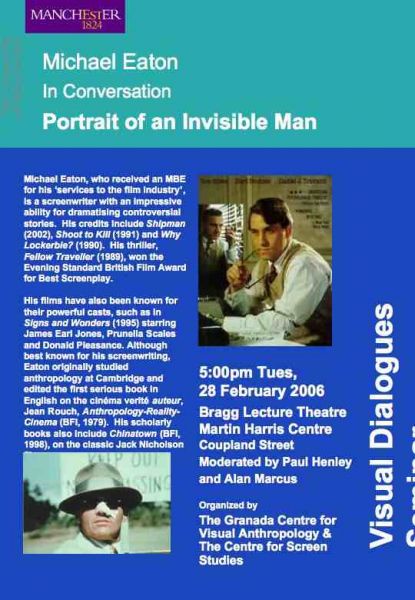
Michael Eaton, who received an MBE for his ‘services to the film industry’, is a screenwriter with an impressive ability for dramatising controversial stories. His credits include Shipman (2002), Shoot to Kill (1991) and Why Lockerbie? (1990). His thriller, Fellow Traveller (1989), won the Evening Standard British Film Award for Best Screenplay. His films have also been known for their powerful casts, such as in Signs and Wonders (1995) starring James Earl Jones, Prunella Scales and Donald Pleasance. Although best known for his screenwriting, Eaton originally studied anthropology at Cambridge and edited the first serious book in English on the cinéma verité auteur, Jean Rouch, Anthropology-Reality-Cinema (BFI, 1979). His scholarly books also include Chinatown (BFI, 1998), on the classic Jack Nicholson film.

Hugh Brody is almost impossible to define. Director and writer of feature films, including 1919 (1985) starring Paul Scofield and Maria Schell; a number of classic documentaries, such as The Eskimos of Pond Inlet (1975), On Indian Land (1986), Hunters and Bombers (1990) and Time Immemorial (1991); and author of two books of fiction and seven non-fiction texts, including On Skid Row (1971), The People’s Land (1975), Maps and Dreams (1981) and The Other Side of Eden (2001). Trained as an anthropologist at Oxford, Hugh Brody has combined his time of living in the Canadian Arctic and the southern Kalahari, with photographing the sculptures of Anthony Gormley in Australia. In this Visual Dialogues seminar, he is going to explore the processes and ethics of storytelling in films, books and oral culture.
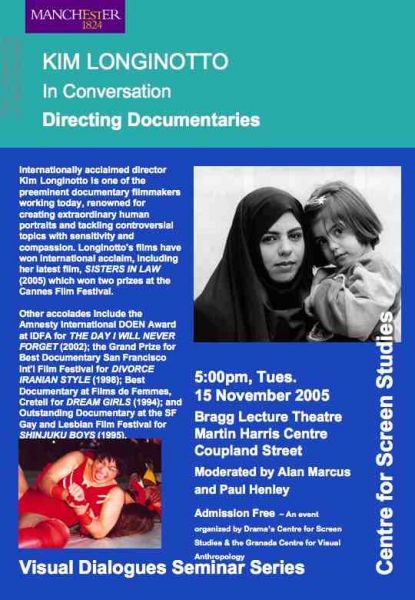
Internationally acclaimed director Kim Longinotto is one of the pre-eminent documentary filmmakers working today, renowned for creating extraordinary human portraits and tackling controversial topics with sensitivity and compassion. Longinotto's films have won international acclaim, including her latest film, Sisters in Law (2005) which won two prizes at the Cannes Film Festival. Other accolades include the Amnesty International DOEN Award at IDFA for The Day I Will Never Forget (2002); the Grand Prize for Best Documentary San Francisco Int'l Film Festival for Divorce Iranian Style (1998); Best Documentary at Films de Femmes, Creteil for Dream Girls (1994); and Outstanding Documentary at the SF Gay and Lesbian Film Festival for Shinjuku Boys (1995).
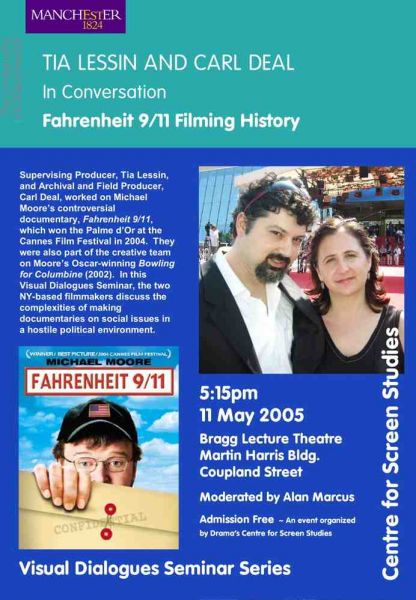
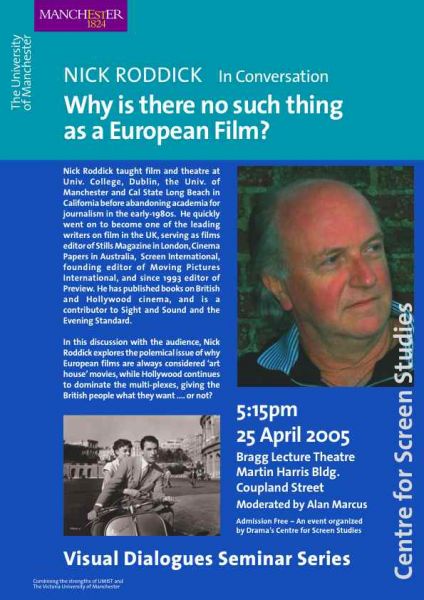
Nick Roddick (1945-2019) taught film and theatre at Univ. College, Dublin, the Univ. of Manchester and Cal State Long Beach in California before abandoning academia for journalism in the early-1980s. He quickly went on to become one of the leading writers on film in the UK, serving as films editor of Stills Magazine in London, Cinema Papers in Australia, Screen International, founding editor of Moving Pictures International, and since 1993 editor of Preview. He has published books on British and Hollywood cinema, and is a contributor to Sight and Sound and the Evening Standard.
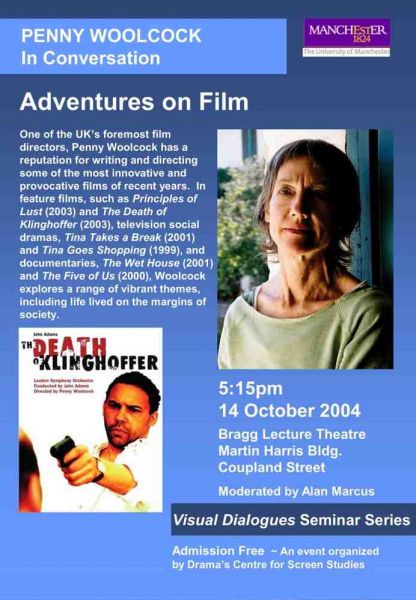
One of the UK’s foremost film directors, Penny Woolcock has a reputation for writing and directing some of the most innovative and provocative films of recent years. In feature films, such as Principles of Lust (2003) and The Death of Klinghoffer (2003), television social dramas, Tina Takes a Break (2001) and Tina Goes Shopping (1999), and documentaries, The Wet House (2001) and The Five of Us (2000), Woolcock explores a range of vibrant themes, including life lived on the margins of society.
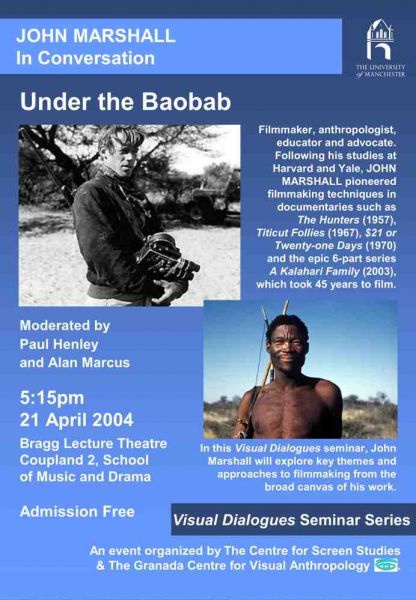
Filmmaker, anthropologist, educator and advocate. Following his studies at Harvard and Yale, John Marshall (1932-2005) pioneered filmmaking techniques in documentaries such as The Hunters (1957), Titicut Follies (1967), $21 or Twenty-one Days (1970) and the epic 6-part series A Kalahari Family (2003), which took 45 years to film.
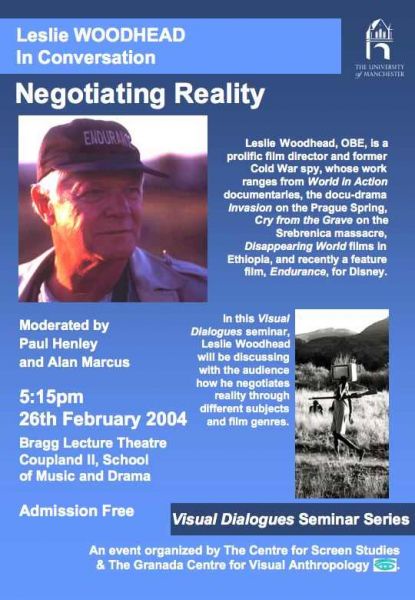
Leslie Woodhead OBE, is a prolific film director, series editor and former Cold War spy, following his days at Cambridge. His work includes the first film of the Beatles (1962), more than one-hundred World in Action documentaries, The Stones in the Park (1969), the docu-drama Invasion (1980) on the Prague Spring, 444 Days (1998), Cry from the Grave (1999) on the Srebrenica massacre, Disappearing World films in Ethiopia, and the feature film, Endurance (1999), for Disney, The Holocaust on Trial (2000) and Milosevic: how to be a dictator (2002).
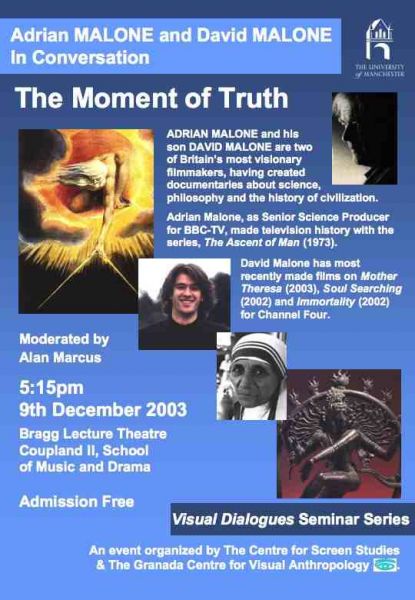
Adrian Malone (1937-2015) and his son David Malone are two of Britain’s most visionary filmmakers, having created documentaries about science, philosophy and the history of civilization. Adrian Malone, as Senior Science Producer for BBC-TV, made television history with the series, The Ascent of Man (1973). His long list of productions include Cosmos (1981), executive producer of Smithsonian World (1986-89), Millennium: tribal wisdom and the modern world (1992) and Uncertainty (1996) for The Discovery Channel. David Malone's films include Soul Searching (2002), Immortality (2002) and Mother Theresa (2003) for Channel Four.
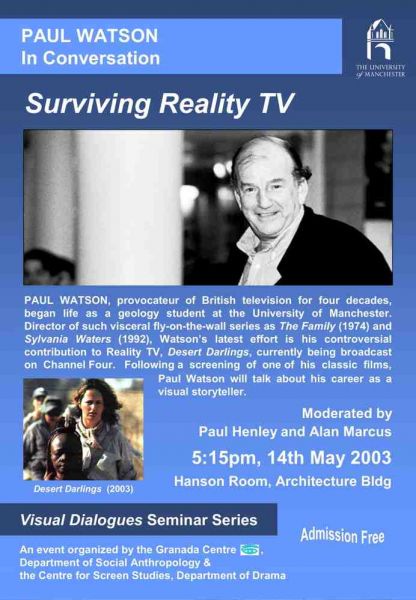
Provocateur of British television for four decades, Paul Watson began life as a geology student at the University of Manchester. Director of such visceral fly-on-the-wall series as The Family (1974) and Sylvania Waters (1992), Watson’s latest effort is his controversial contribution to Reality TV, Desert Darlings, broadcast in 2004 on Channel Four. Following a screening of one of his classic films, Paul Watson talks about his career as a visual storyteller.
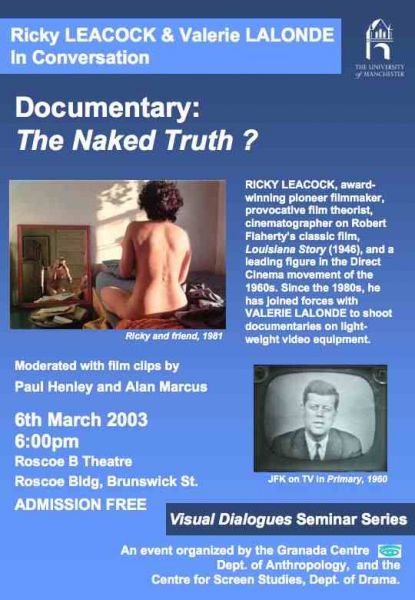
The debut of the Visual Dialogues series during the 2002-03 academic year, co-organized by the Granada Centre for Visual Anthropology and the Centre for Screen Studies, featured Ricky Leacock (1921-2011), a leading figure in the Direct Cinema movement in the US in the early1960s. Leacock is an ward-winning pioneer filmmaker, provocative film theorist, and was cinematographer on Robert Flaherty’s classic film, Louisiana Story (1946). Since the 1980s, he has joined forces with Valerie Lalonde to shoot documentaries on light- weight video equipment.
- Teaching
-
- Publications
-
Page 1 of 2 Results 1 to 25 of 33
City of Toys
Non-textual Forms: Digital or Visual Products- [ONLINE] City of Toys description
Madame Donalda
Non-textual Forms: Digital or Visual Products216 Beach Walk, Waikiki research film: ProQuest distributor Alexander Street
Non-textual Forms: Digital or Visual ProductsThe New Colossus research film: ProQuest distributor Alexander Street
Non-textual Forms: Digital or Visual Products216 Beach Walk, Waikiki
Non-textual Forms: Digital or Visual ProductsThe New Colossus
Non-textual Forms: Digital or Visual ProductsThe Forgotten Jew in the City of Youth
Non-textual Forms: Digital or Visual ProductsNear the Palace
Non-textual Forms: Digital or Visual ProductsFeininger's Window
Non-textual Forms: Digital or Visual Products85 Miles North of the Equator
Non-textual Forms: Digital or Visual ProductsThe Molo of Venice
Non-textual Forms: Digital or Visual ProductsIn The Birch Grove
Non-textual Forms: Digital or Visual ProductsOne Hot Day
Non-textual Forms: Digital or Visual ProductsOne Market Day
Non-textual Forms: Digital or Visual ProductsPlace With No Dawn: A town’s evolution and Erskine’s Arctic utopia
Architecture and the Canadian fabric. Windsor-Liscombe, R. (ed.). UBC Press, pp. 283-310, 21 pagesChapters in Books, Reports and Conference Proceedings: ChaptersA tale of two cities: Dachau and KZ Munich
The city and the moving image: urban projections. Koeck, R., Roberts, L. (eds.). Palgrave Macmillan, pp. 125-139, 15 pagesChapters in Books, Reports and Conference Proceedings: ChaptersThe Cemetery
Non-textual Forms: Digital or Visual ProductsThe Memorial
Non-textual Forms: Digital or Visual ProductsThrough the lens
Wolfson College Cambridge, vol. 34, pp. 52-55Contributions to Specialist Publications: ArticlesThe Ghetto
Non-textual Forms: Digital or Visual ProductsBeautiful Dachau's Contested Urban Identity
Visualizing the City. Marcus, A., Neumann, D. (eds.). Routledge, pp. 1-17, 16 pagesChapters in Books, Reports and Conference Proceedings: ChaptersVisualizing the City
Routledge, Abington, United Kingdom. 264 pagesBooks and Reports: BooksIn Place of Death
Non-textual Forms: Digital or Visual ProductsFilm Studies Special Issue: Sex in the City
Film Studies, vol. 11, no. 1, pp. i-71Contributions to Journals: Special IssuesThe Interracial Romance as Primal Drama: Touch of Evil and Diamond Head
Film Studies, vol. 11, no. 1, pp. 14-26Contributions to Journals: Articles
